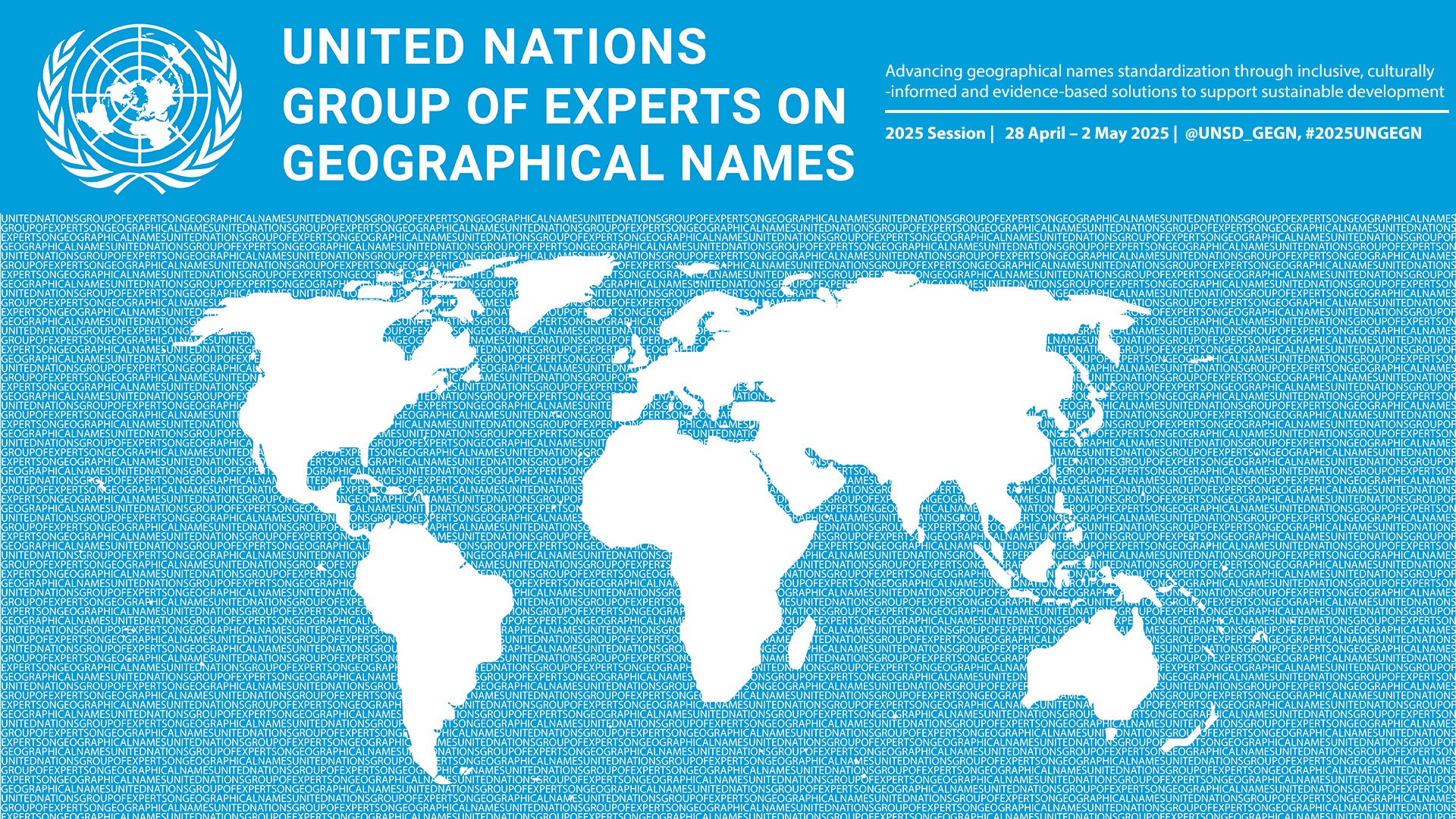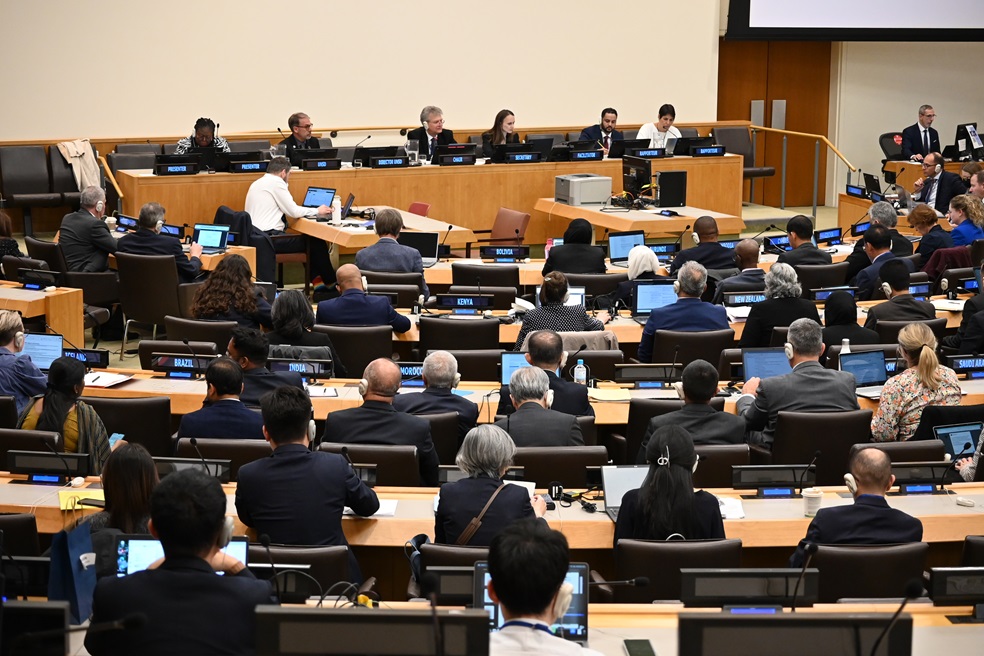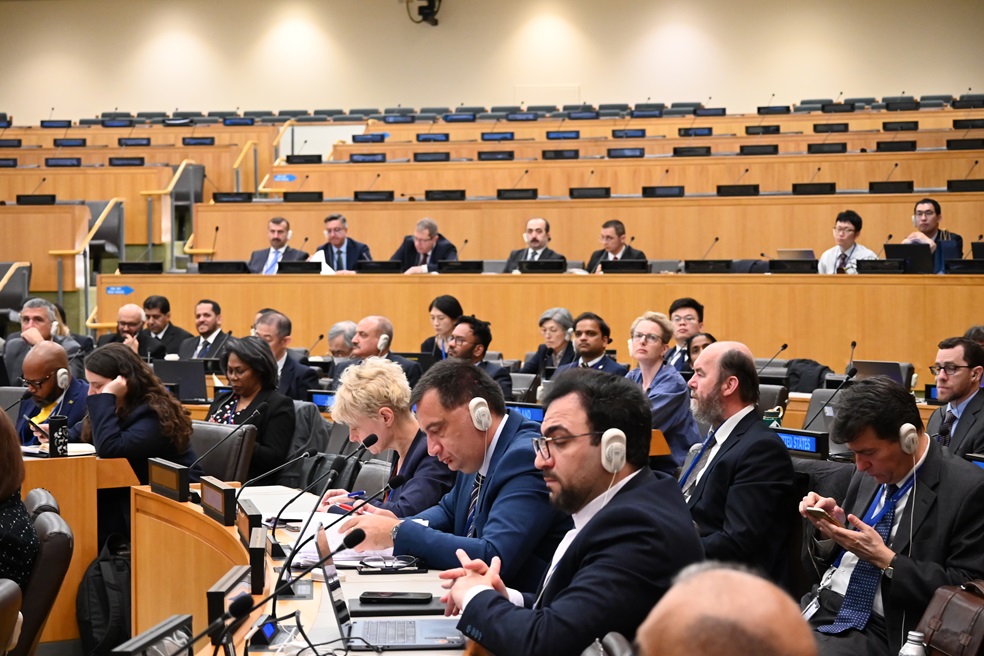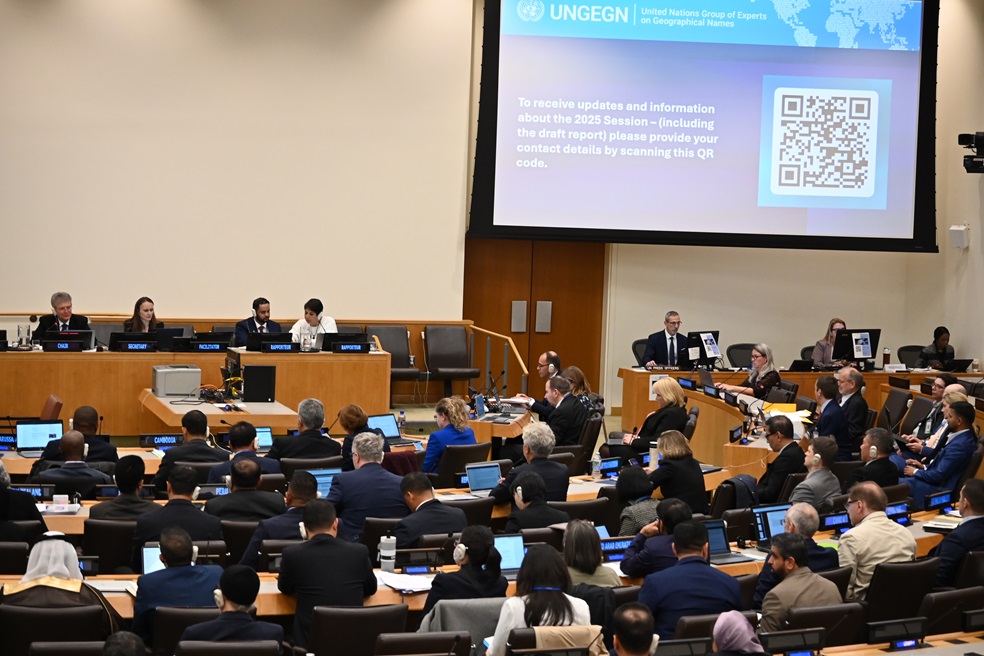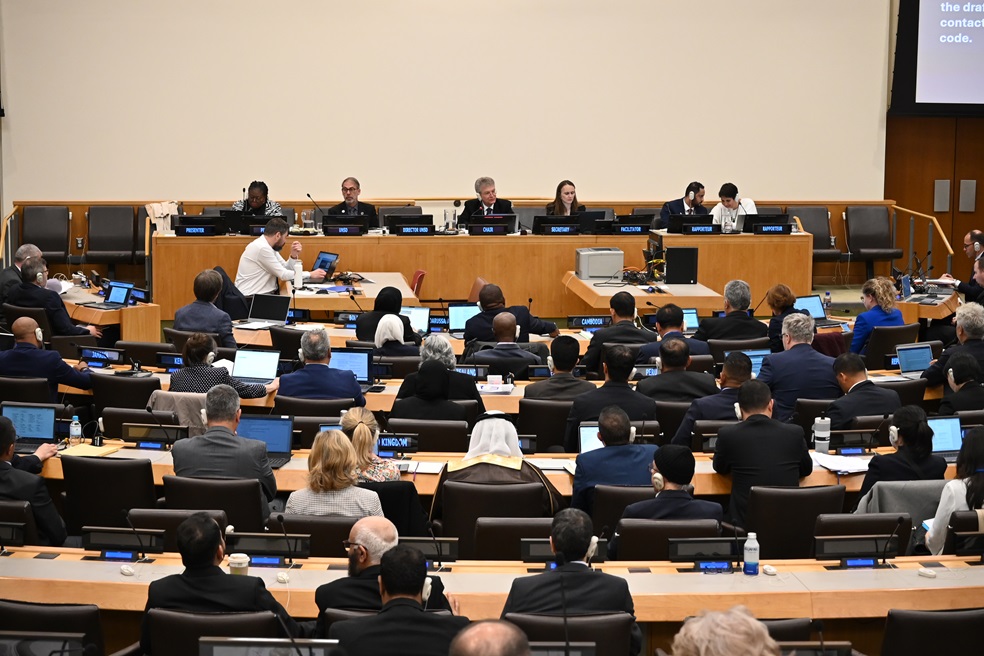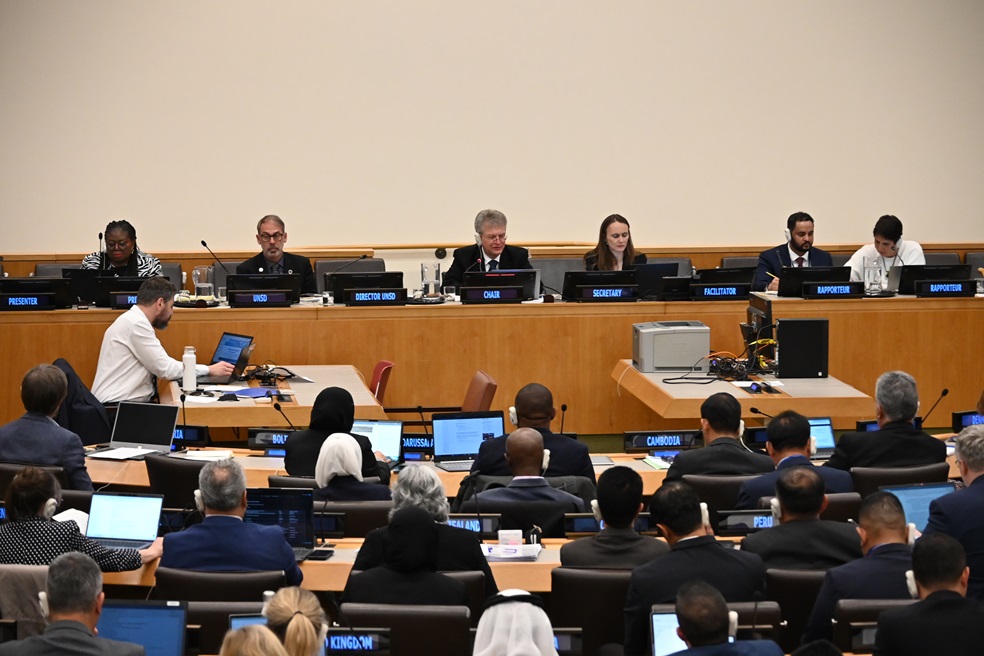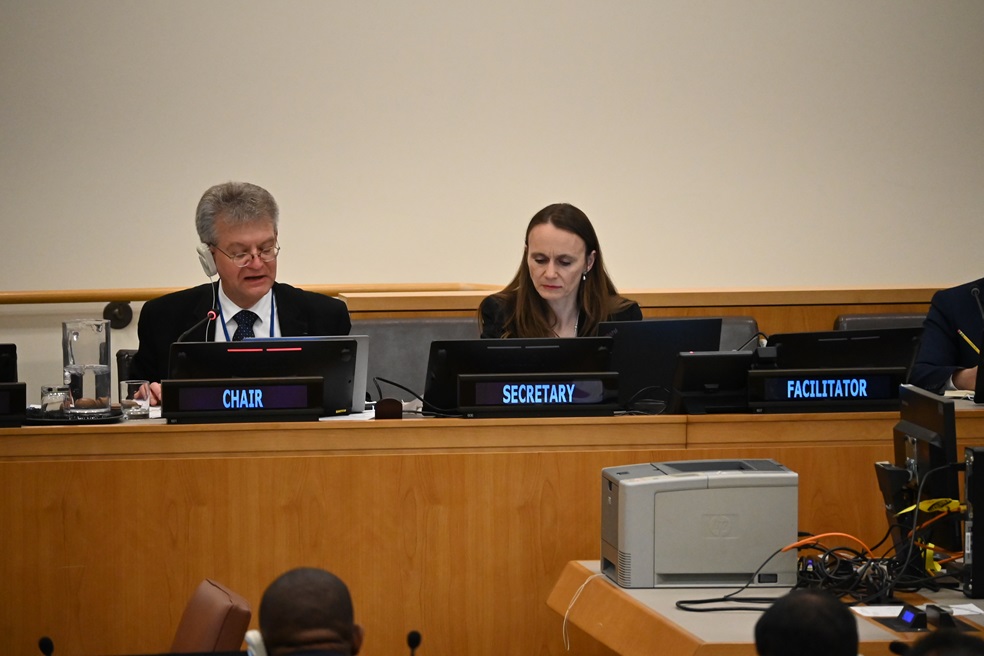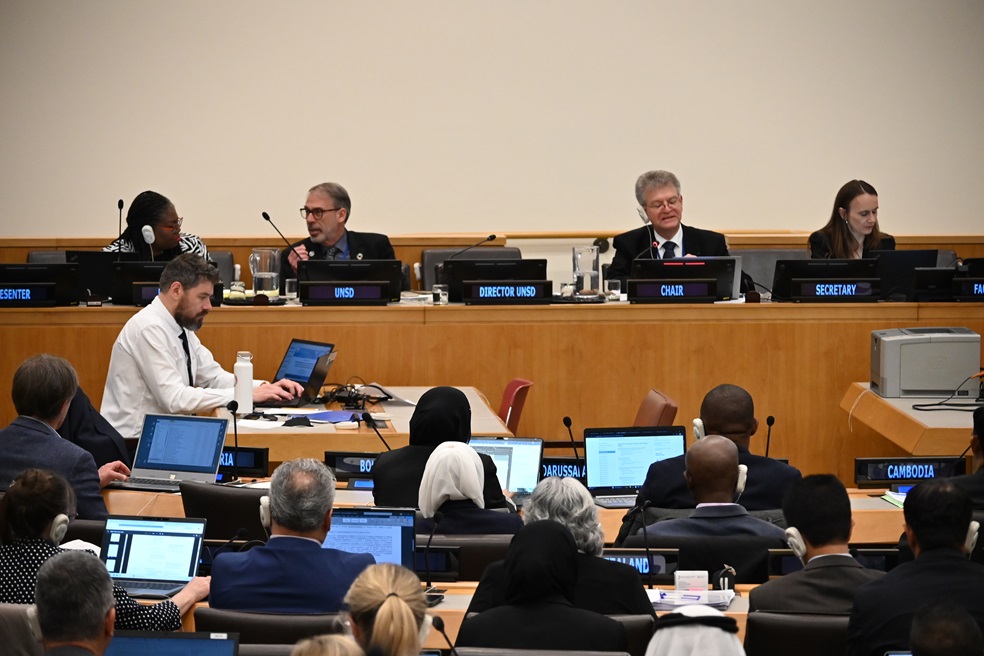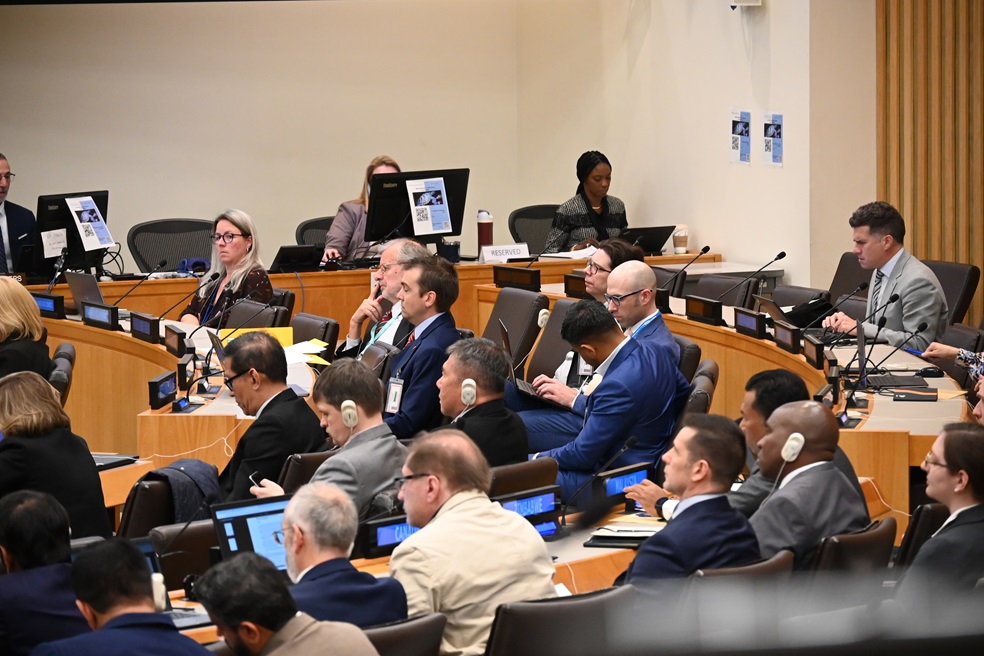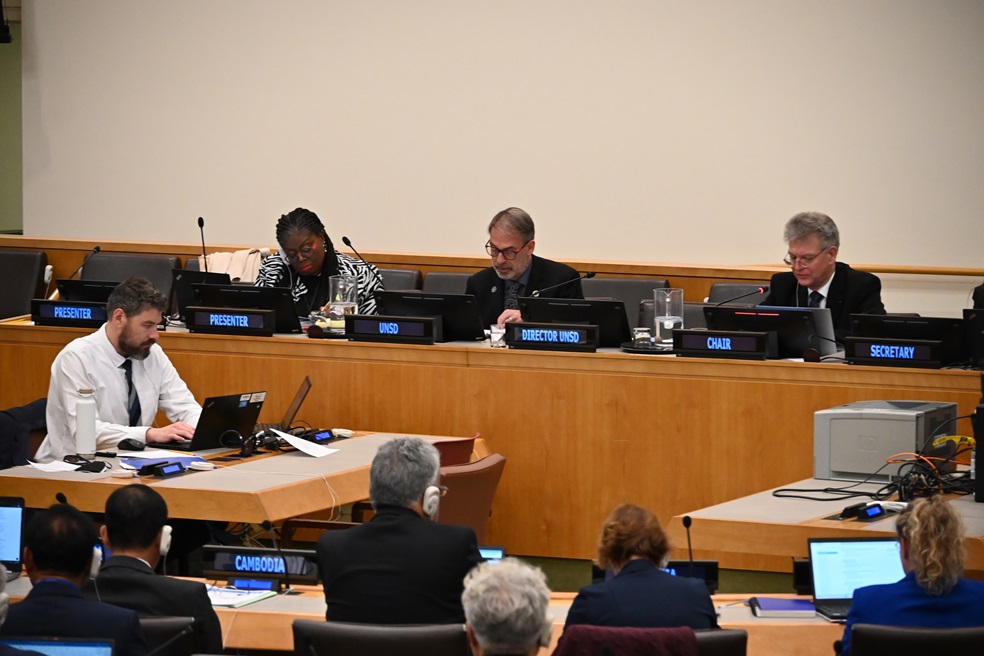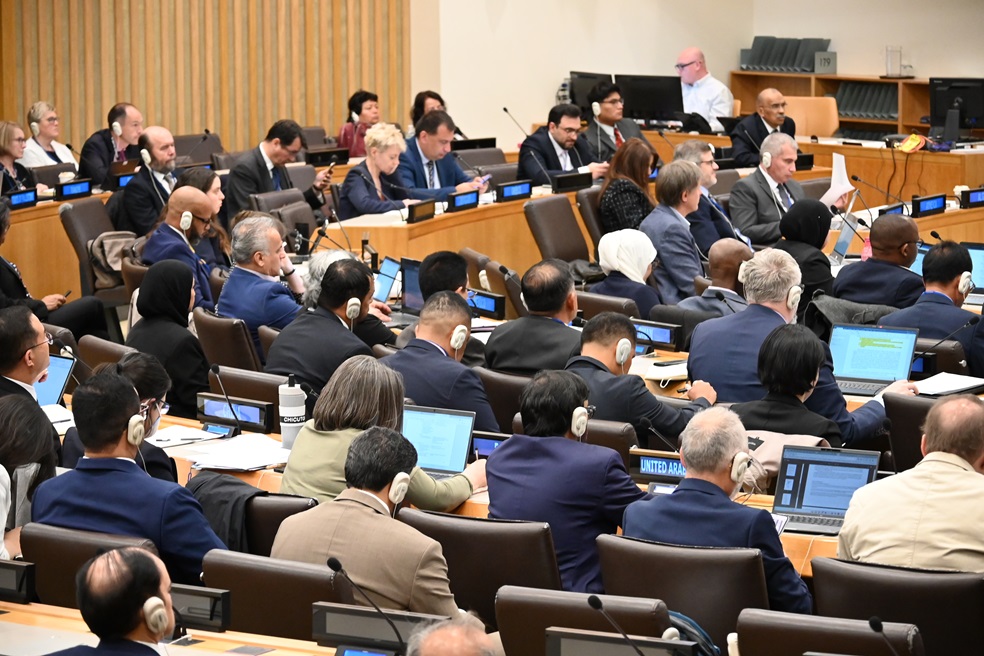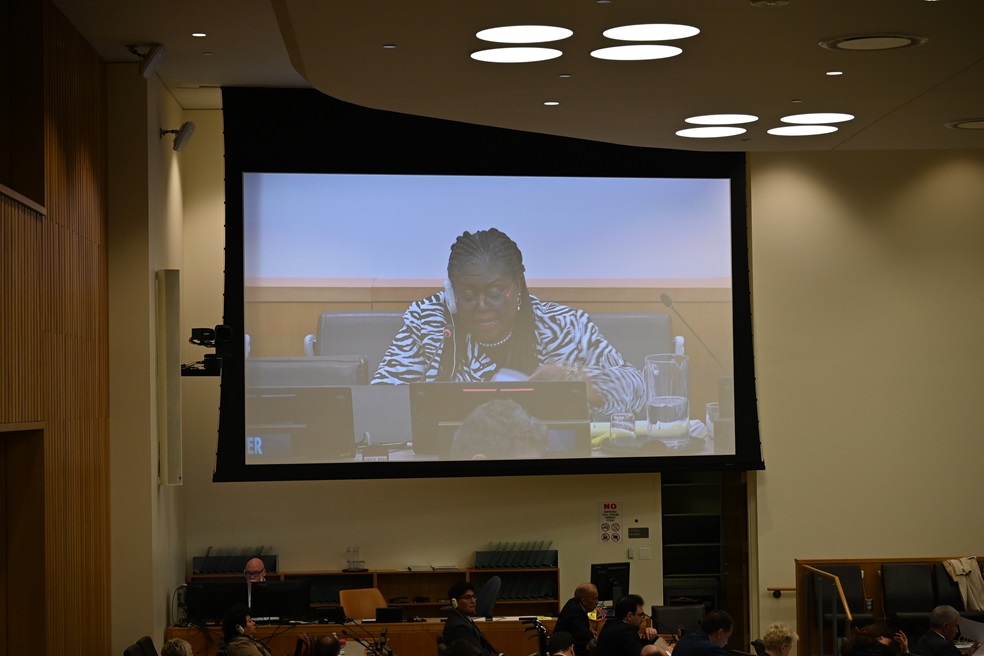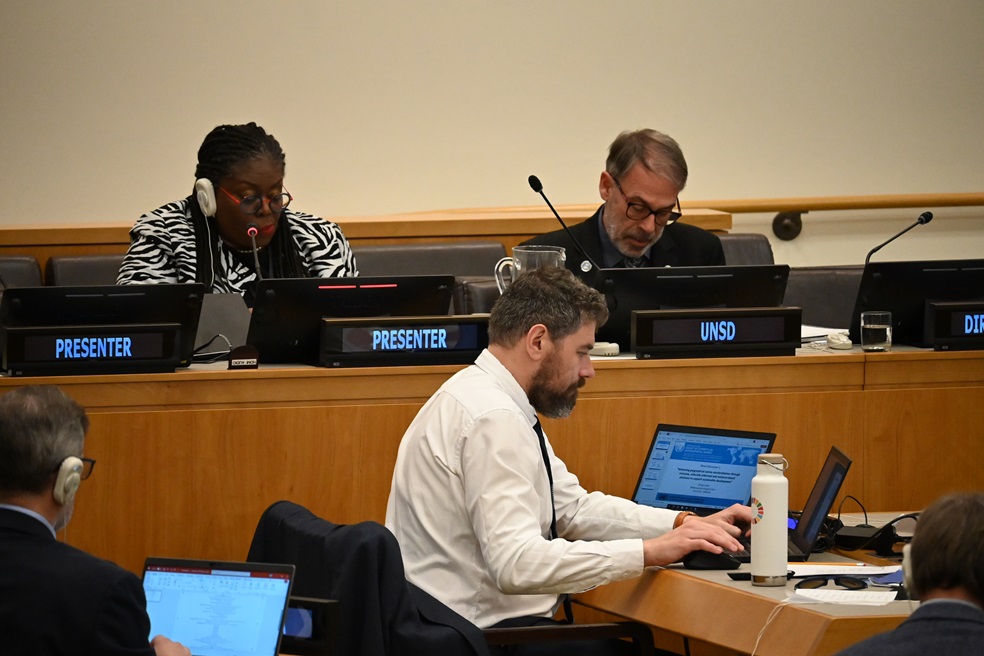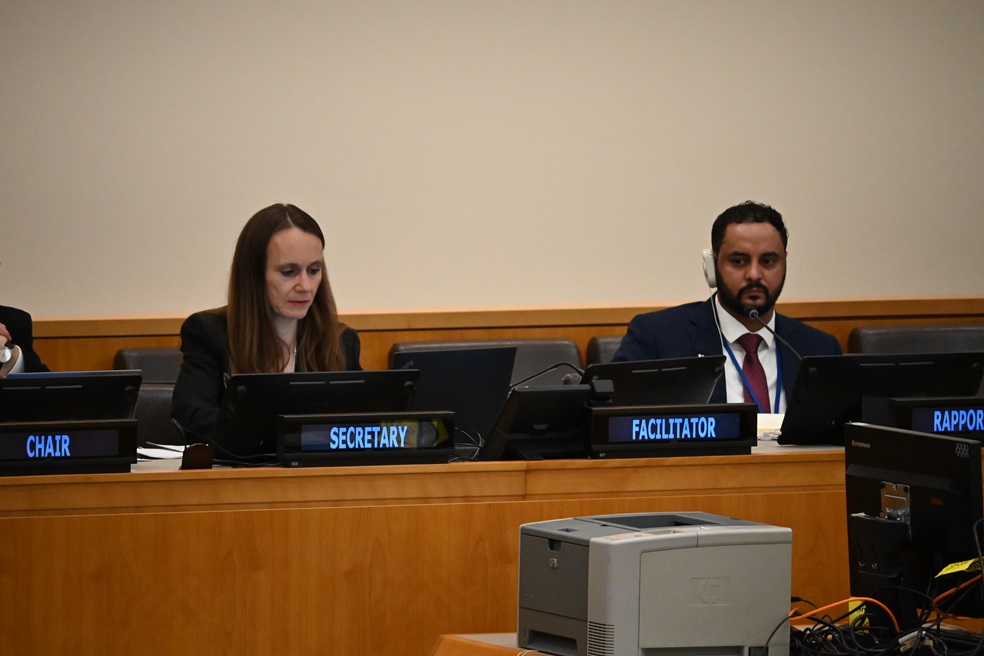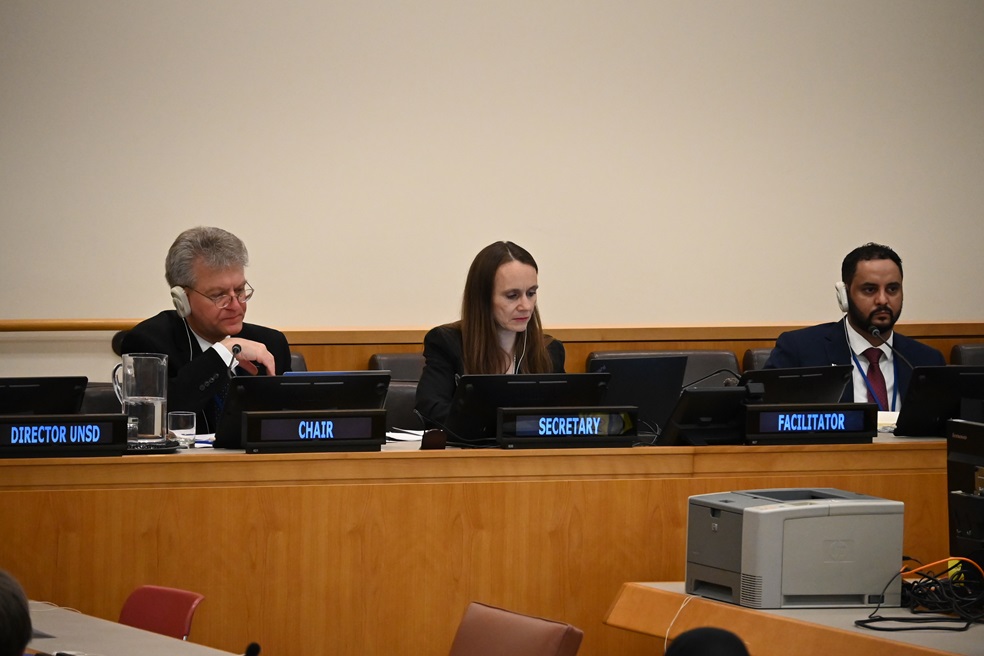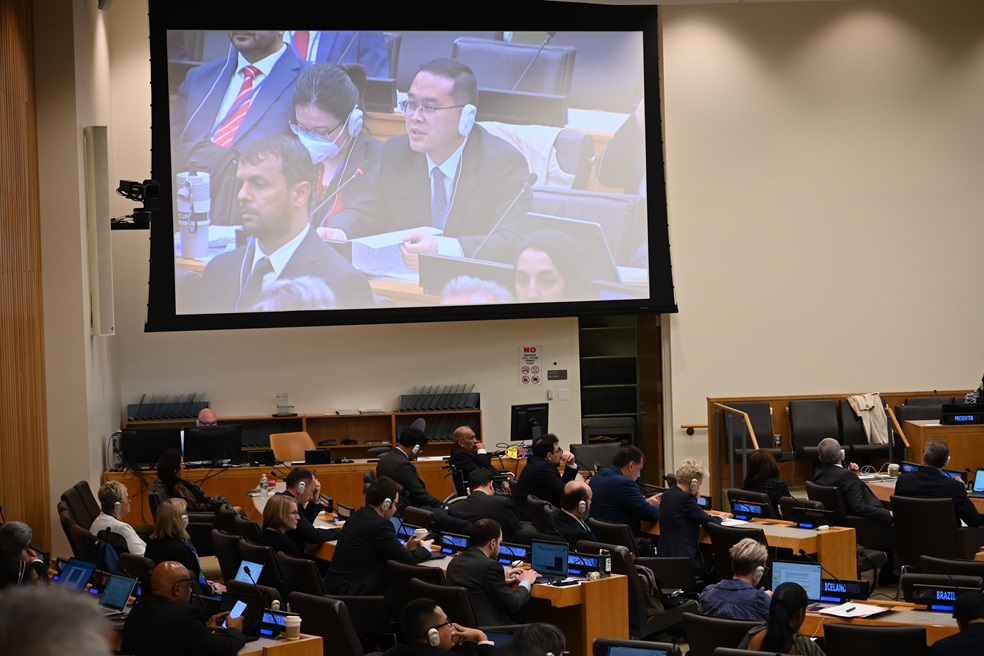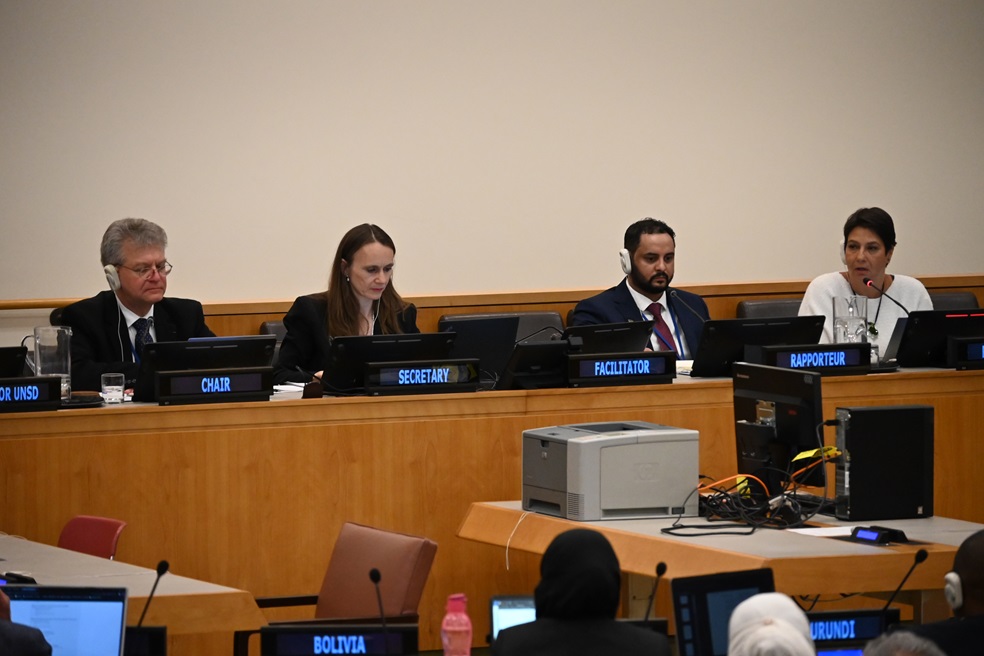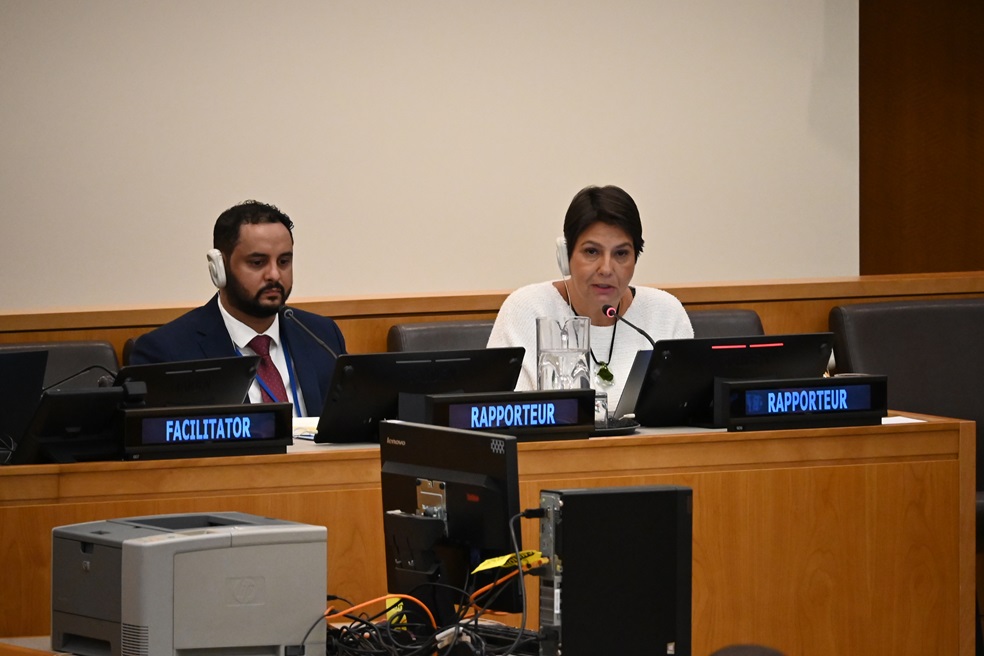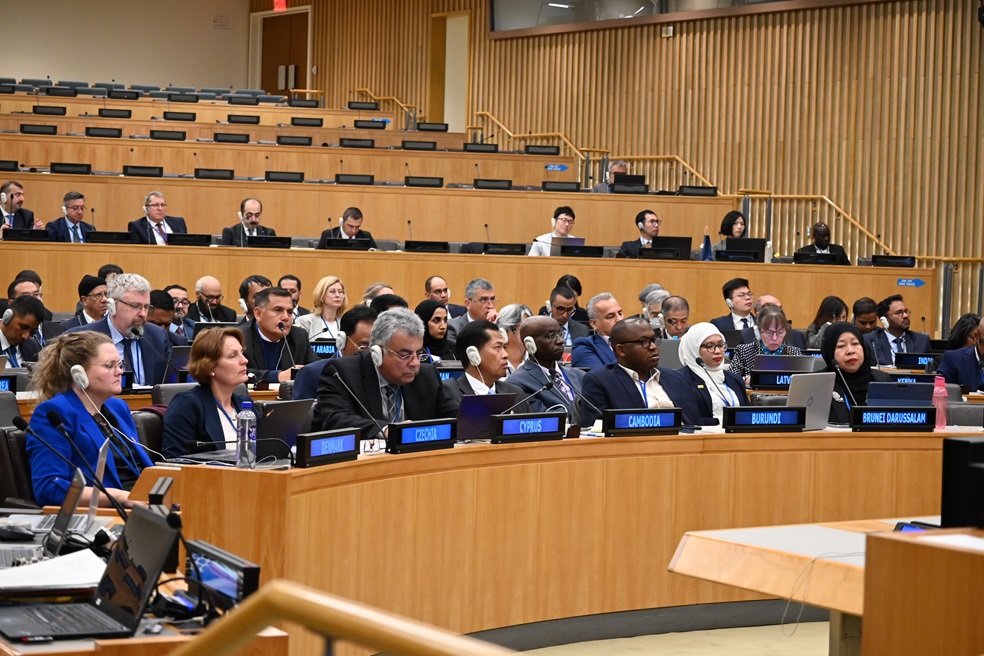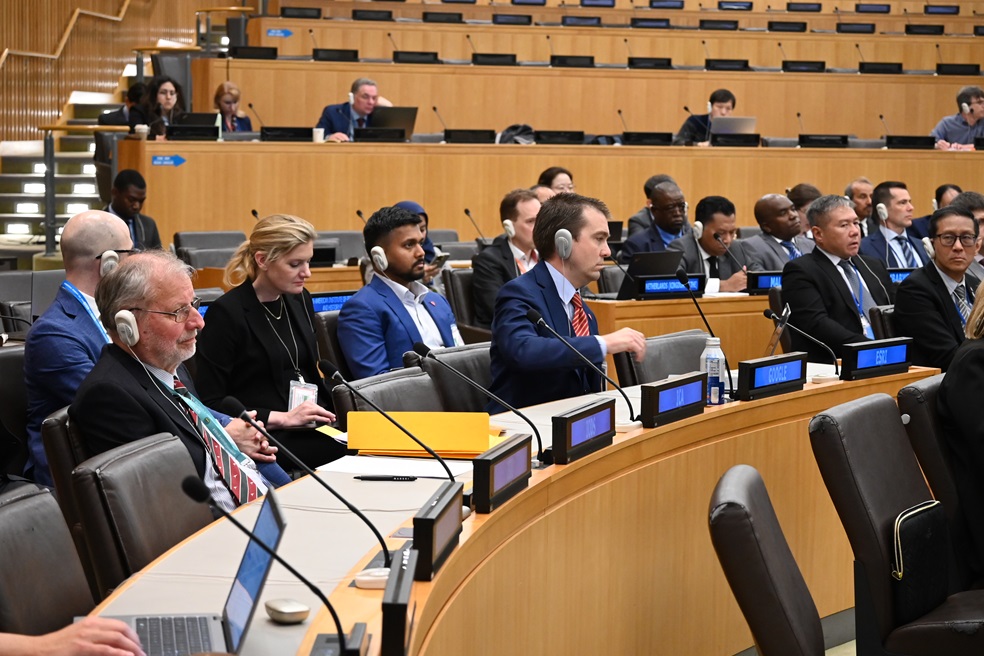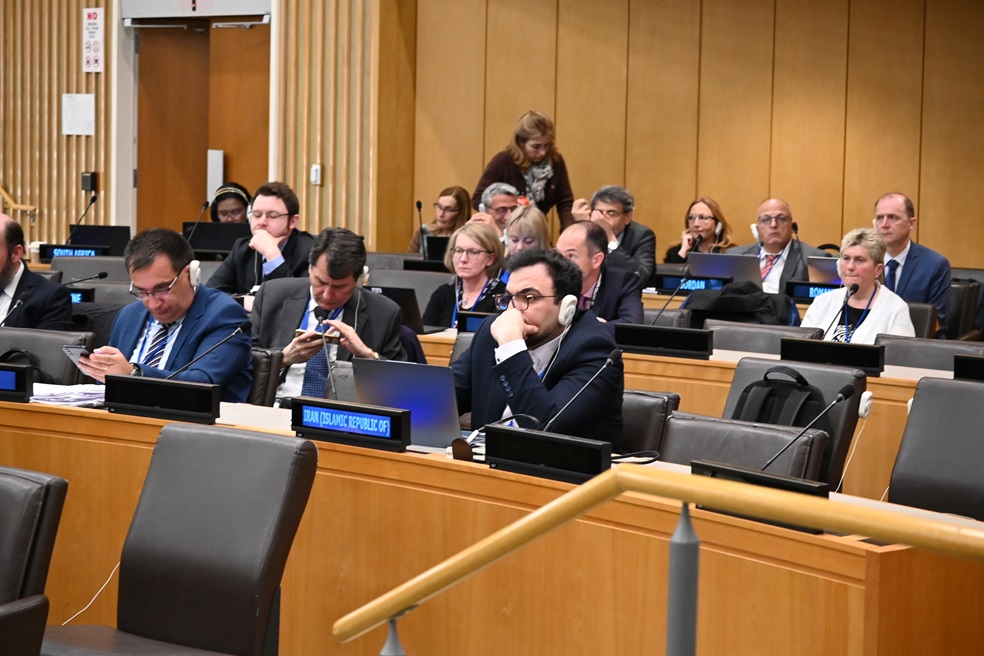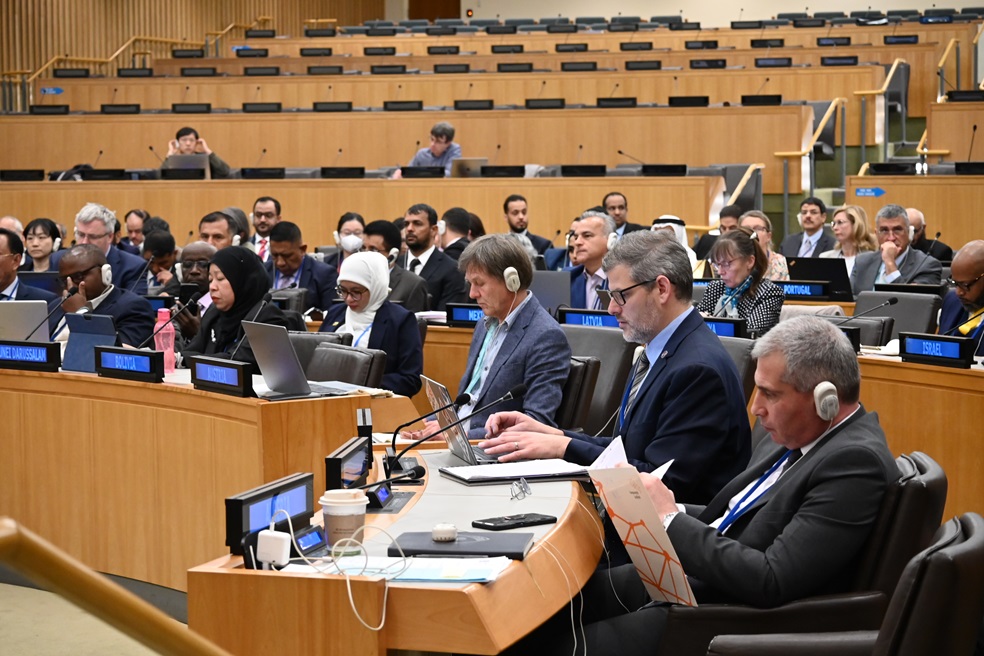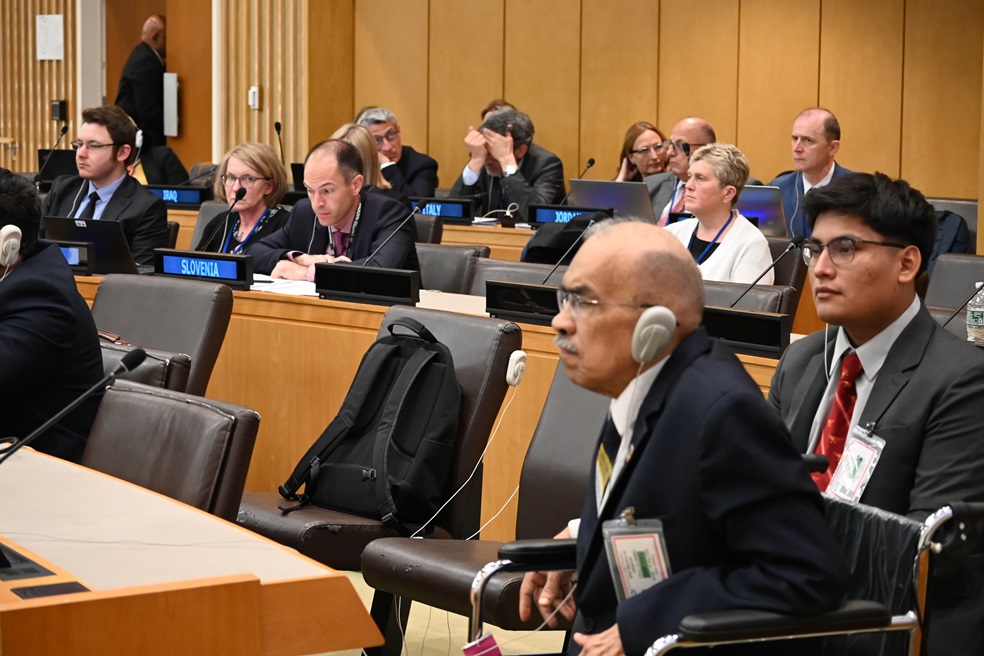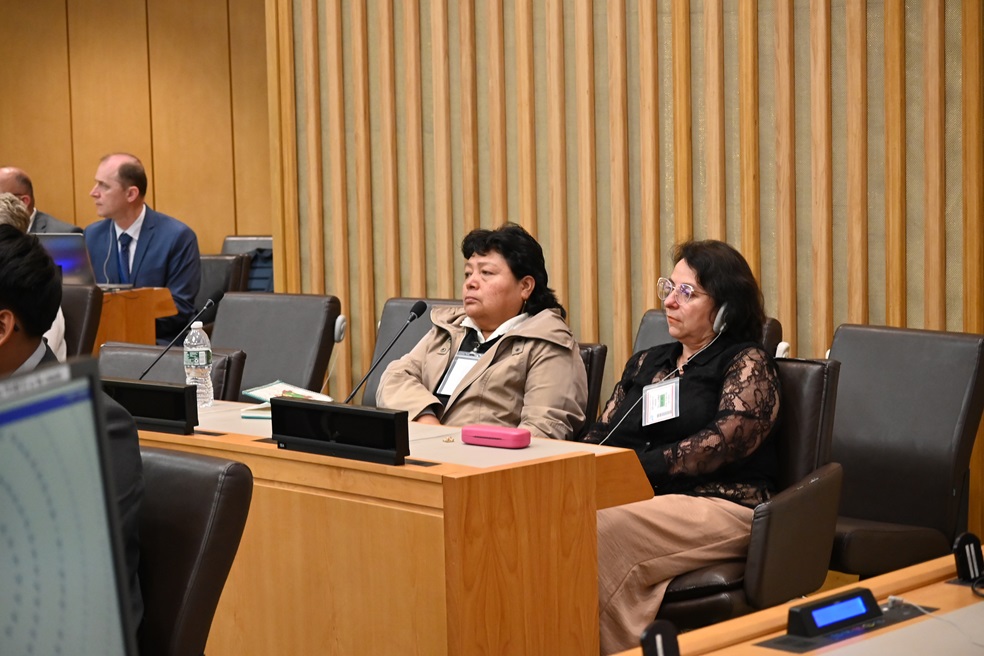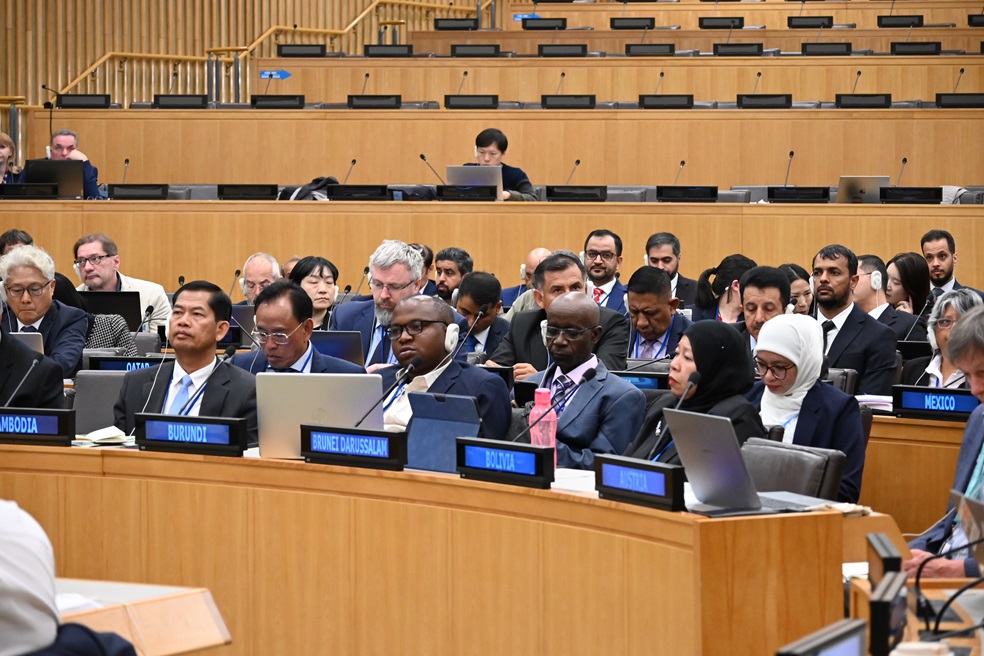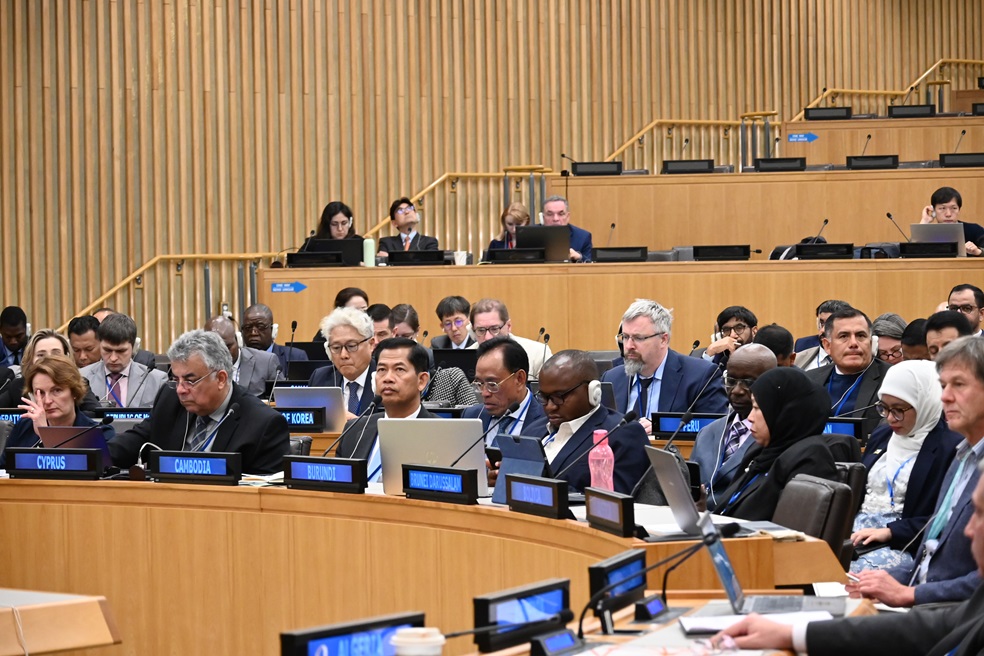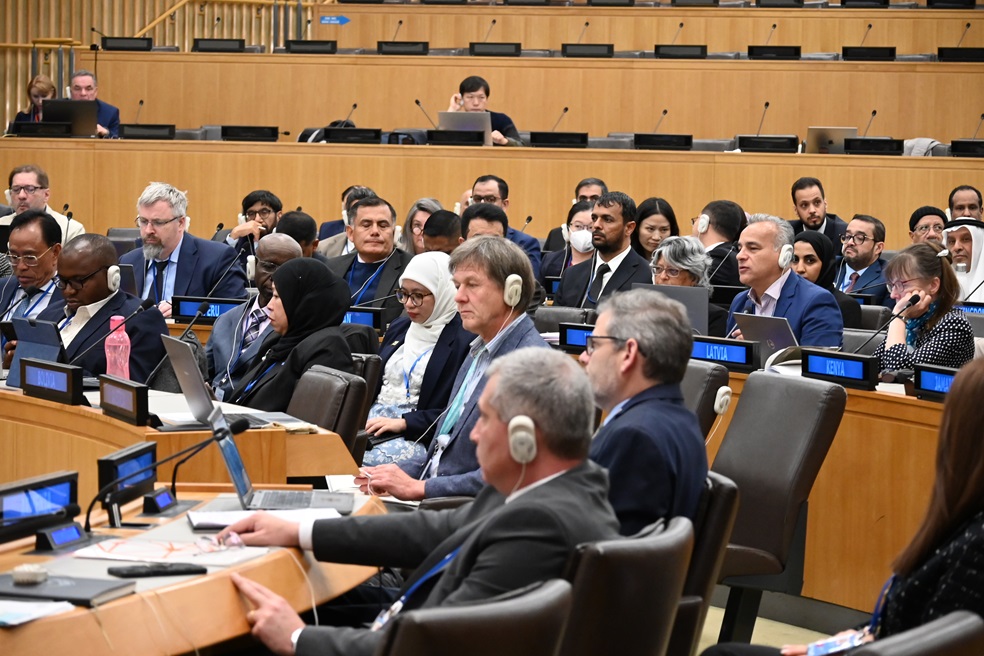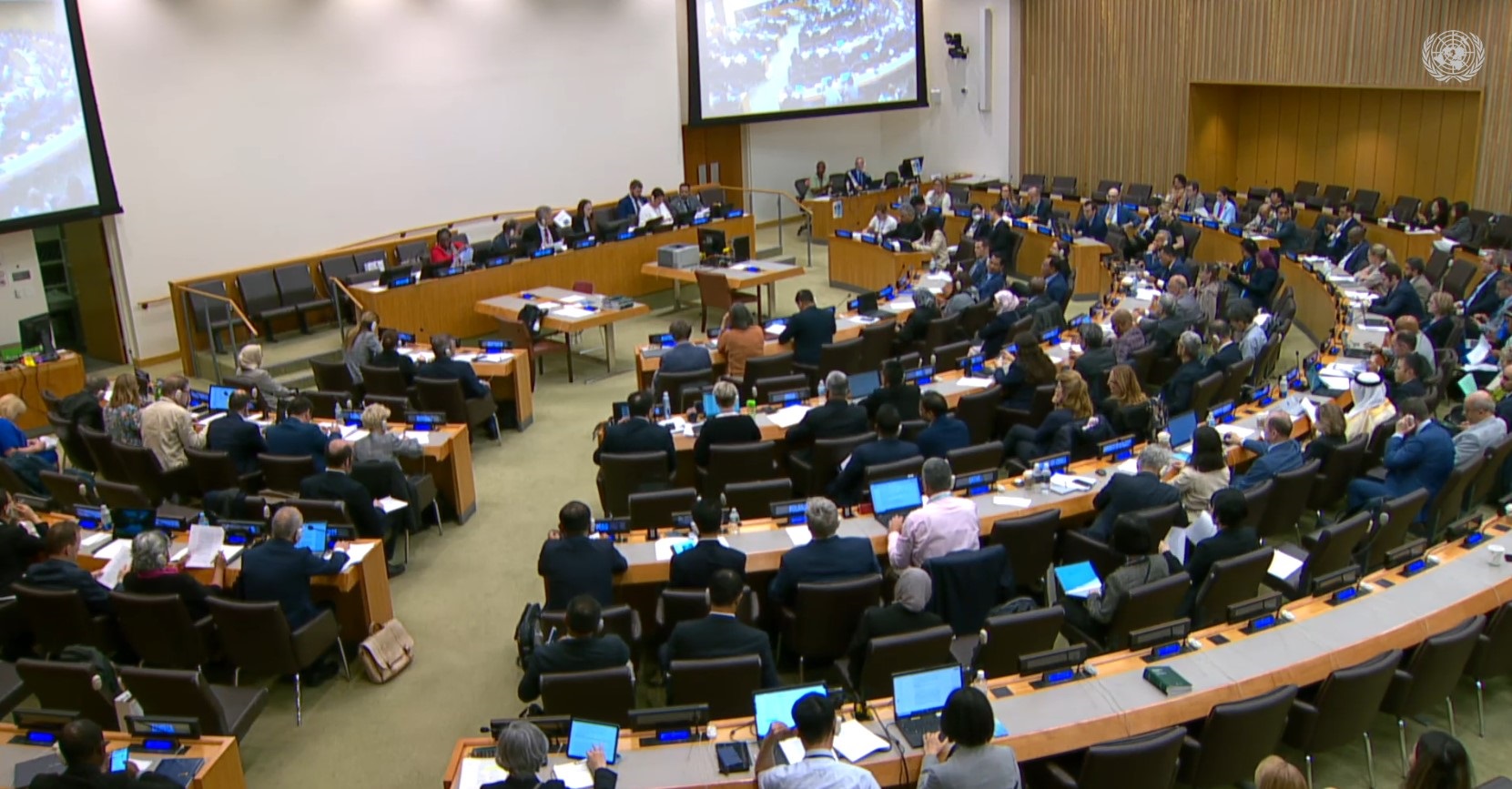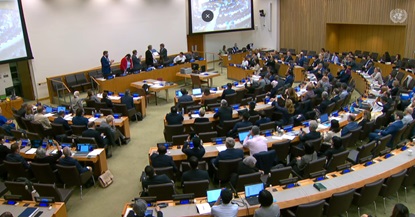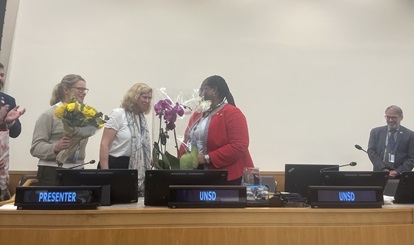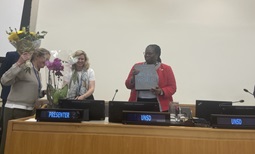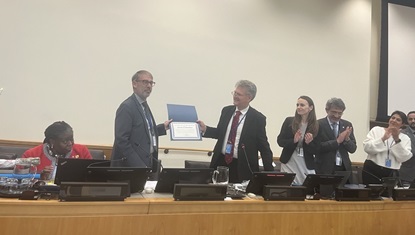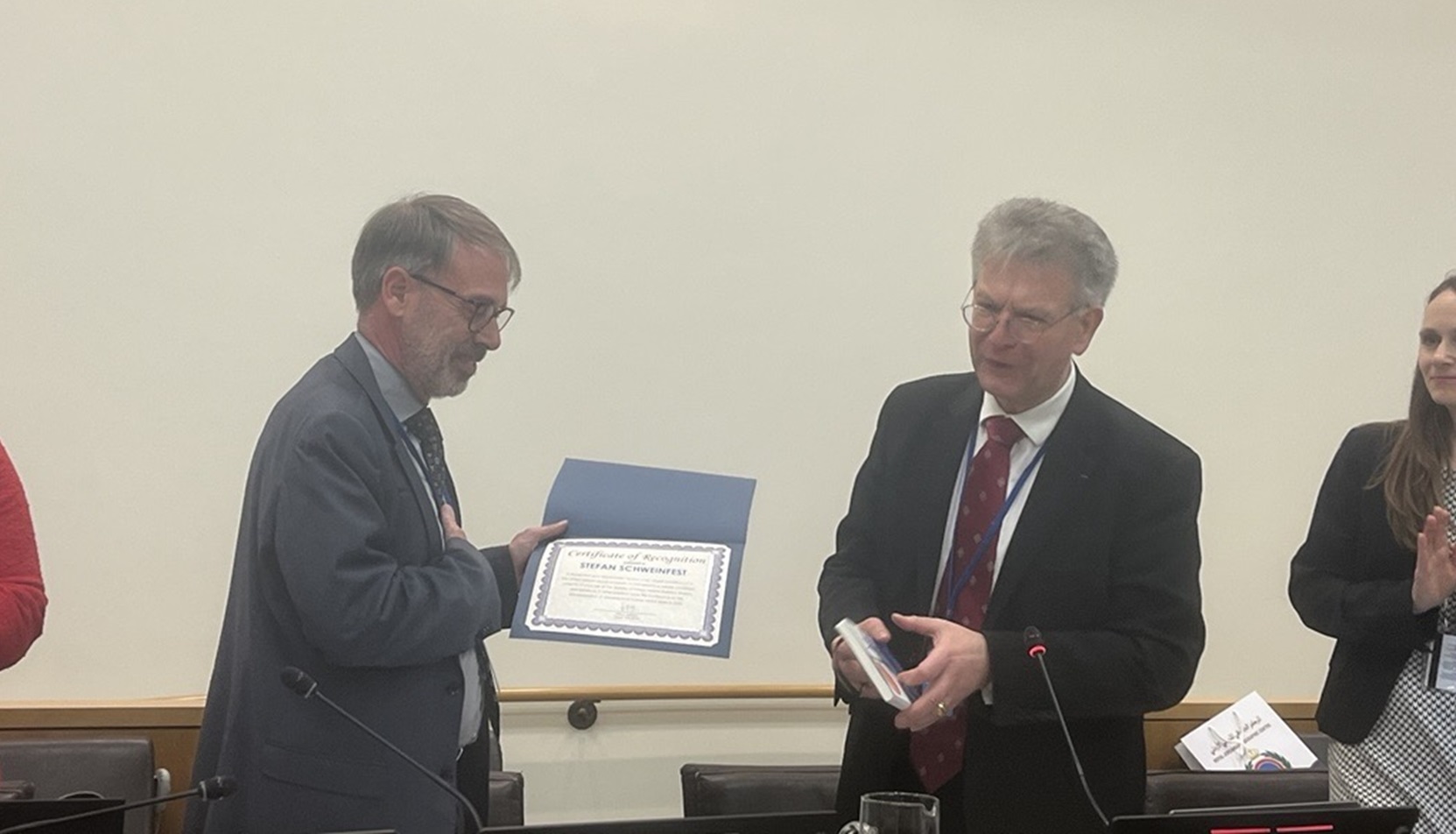2025 UNGEGN Session EVALUATION form (English)
"Advancing geographical names standardization through inclusive, culturally-informed and evidence-based solutions to support sustainable development"
In accordance with Economic and Social Council resolution E/RES/2018/2 of 10 November 2017 and decision 2023/338 of 25 July 2023, the United Nations Group of Experts on Geographical Names convened its 2025 session from 28 April to the 2 May 2025 at the United Nations Headquarters in New York, in conference room three. There were 9 meetings of the 2025 session and each meeting will be three hours: 10:00 a.m - 1:00 p.m. and 3:00 - 6:00 p.m.. In all, 197 participants representing 56 Member States across UNGEGN’s geographical and linguistic divisions and observers participated. Opening the session, Ms Bjørg Sandkjær, Assistant Secretary-General for Policy Coordination and Inter-Agency Affairs, DESA highlighted that less than five years remain to meet the 2030 Agenda for Sustainable Development, and emphasized that standardized geographical names are essential to achieving the SDGs, observing that “far from being mere labels, place names underpin data collection, analysis, and decision-making that shape sustainable outcomes worldwide”.
Member States shared national progress in several “National Dialogues” segment, sharing innovative good practices in geographical names management with updates from Australia, Austria, Brazil, Brunei Darussalam, Canada, Cyprus, Czechia, Denmark, Estonia, Hungary, Iceland, India, Italy, Japan, Malaysia, Mexico, New Zealand, Norway, Poland, Republic of Korea, Russian Federation, Saudi Arabia, Slovenia, and Sweden. These contributions demonstrated the breadth of national approaches to standardization, preservation, and innovation. Further, the UN Committee of Experts on Global Geospatial Information Management reaffirmed its strong collaboration with UNGEGN, in recognizance that geographical names as a Global Fundamental Geospatial Data Theme, acknowledging the work done as part of its “Collaboration Project: good practices of National Mapping Agencies and National Geographical Names Authorities” and welcoming further updates at the forthcoming fifteenth session of UN-GGIM in August this year. Further, the adoption of a Universal Unique Identifier for Cities marked a significant advance in harmonizing geospatial data infrastructure and updates on the World Geographical Names Database highlighted how Member States can provide their geographical names to the United Nations across languages and scripts.
Interactive panels throughout the session addressed the cultural, linguistic, and developmental dimensions of geographical names, underscoring their role in fostering inclusive, culturally informed, and evidence-based development approaches. Notably, a side event on “Geographical names as cultural heritage” featured a keynote by Ms Aluki Kotierk, Chair of the UN Permanent Forum on Indigenous Issues and ex-President of Nunavut Tunngavik Incorporated (NTI - the representative body of the Nunavut Inuit), who emphasized protecting names as living expressions of identity within and across borders and generations..
A highlight of the week was the special session on Artificial Intelligence (AI) and the future of geographical names standardization, including discussions on generative AI applications for Arabic geographical names, illustrating how emerging technologies can support consistency, romanization, linguistic respect, and national capacity development. Side events and discussions reinforced the role of naming in recognizing minority and Indigenous languages and promoting participatory governance, while also examining tools such as the World Geographical Names Database and country-led innovations in legal and institutional frameworks.
From updates on national naming policies to deep dives into language recognition, cultural heritage, and the role of standardization in sustainable development, the 2025 session of UNGEGN showcased the richness and relevance of geographical names work. It also highlighted innovative tools, celebrated cross-country and interdisciplinary collaboration, and reaffirmed a shared global commitment to inclusive, culturally respectful, and evidence-based naming practices as part of a sustainable and equitable future. Guided by the mandates adopted in its closing session, UNGEGN now “gets back to work” and will meet again in-person in May 2027 for its 2027 Session
ObjectivesUNGEGN sessions provide a forum where experts from the interrelated fields of geography, cartography, geospatial information, linguistics and history, from across the world come together to learn and share best practices and norms, new developments in geographical names administration and standardization. The session also highlights the Group's role as an enabler in preserving cultural heritage and where appropriate support relevant aspects of the 2030 Agenda for Sustainable Development. This session will address the theme "Advancing geographical names standardization through inclusive, culturally-informed and evidence-based solutions to support sustainable development". This theme conforms with General Assembly resolution 70/1, which called for ECOSOC inter-governmental bodies and forums to reflect the integrated nature of the sustainable development goals (SDGs) as well as the interlinkages between them. The 2025 theme was therefore created based on ECOSOC's SDG theme for 2025, 'Advancing sustainable, inclusive, science- and evidence-based solutions for the 2030 Agenda for Sustainable Development and its Sustainable Development Goals for leaving no one behind' which focuses on the review of SDG goals 3, 5, 8, 14 and 17. Therefore, it is beneficial to encourage focus on this topic and create a platform through the 2025 session to explore inclusive, culturally-informed and evidenced based solutions are being employed by Member States to achieve their goals, and in turn support the Sustainable Development Goals. The Group of Experts has a robust work programme anchored in its Strategic Plan and Programme of Work 2021-2029.
Note:
Please be informed that the technical reports submitted by regional entities and member states are not reviewed or edited by the Secretariat. These reports facilitate the technical discussion of the subject matters on the agenda and help clarify technical issues. The contents of the reports does not reflect the position of the United Nations Secretariat.
The designations employed and the presentation of material does not imply the expression of any opinion whatsoever on the part of the Secretariat of the United Nations concerning the legal status of any country, city or area, or of its authorities, concerning the appellation of places, or concerning the delimitation of its frontiers or boundaries.
Documents (general)
- Report of the United Nations Group of Experts on Geographical Names on its 2025 session
List of documents by agenda item
(click on agenda item in left column)
Note:
Please be informed that the technical reports submitted by regional entities and member states are not reviewed or edited by the Secretariat. These reports facilitate the technical discussion of the subject matters on the agenda and help clarify technical issues. The contents of the reports does not reflect the position of the United Nations Secretariat.
The designations employed and the presentation of material does not imply the expression of any opinion whatsoever on the part of the Secretariat of the United Nations concerning the legal status of any country, city or area, or of its authorities, concerning the appellation of places, or concerning the delimitation of its frontiers or boundaries.
Agenda item 2. Organizational matters
- Provisional Agenda
- Annotations to the provisional agenda
- Organization of work
Agenda item 3. Reports of the Bureau and the Secretariat: Report of the Chair
item 3(a). Report of the Chair
- Report of the Chair
- Submitted by the Chair
- GEGN.2/2025//CRP.4, Report
Français / English
item 3(b). Report of the Secretariat
- Report of the Secretariat
- Submitted by the UNGEGN Secretariat
- GEGN.2/2025/5/CRP.5, Report
English
item 3(c). Monitoring and evaluation of the United Nations Group of Experts on Geographical Names strategic plan and programme of work 2021–2029
- Implementation of the United Nations Group of Experts on Geographical Names strategic plan and programme of work 2021-2029 during the period of 2023-2025
- Submitted by the UNGEGN Bureau
- GEGN.2/2025/161/CRP.161, Report
English
- Background documents
GEGN.2/2025/161/CRP.161/Add.1 |
GEGN.2/2025/161/CRP.161/Add.2
- GEGN.2/2025//CRP.4, Report Français / English
item 3(b). Report of the Secretariat
- Report of the Secretariat
- Submitted by the UNGEGN Secretariat
- GEGN.2/2025/5/CRP.5, Report
English
item 3(c). Monitoring and evaluation of the United Nations Group of Experts on Geographical Names strategic plan and programme of work 2021–2029
- Implementation of the United Nations Group of Experts on Geographical Names strategic plan and programme of work 2021-2029 during the period of 2023-2025
- Submitted by the UNGEGN Bureau
- GEGN.2/2025/161/CRP.161, Report
English
- Background documents
GEGN.2/2025/161/CRP.161/Add.1 |
GEGN.2/2025/161/CRP.161/Add.2
- GEGN.2/2025/5/CRP.5, Report English
item 3(c). Monitoring and evaluation of the United Nations Group of Experts on Geographical Names strategic plan and programme of work 2021–2029
- Implementation of the United Nations Group of Experts on Geographical Names strategic plan and programme of work 2021-2029 during the period of 2023-2025
- Submitted by the UNGEGN Bureau
- GEGN.2/2025/161/CRP.161, Report
English
- Background documents
GEGN.2/2025/161/CRP.161/Add.1 |
GEGN.2/2025/161/CRP.161/Add.2
- GEGN.2/2025/161/CRP.161, Report English
- Background documents GEGN.2/2025/161/CRP.161/Add.1 | GEGN.2/2025/161/CRP.161/Add.2
Agenda item 4(a). Reports: Divisions of the Group of Experts
- Report of the East Central and South-East Europe Division 2023-2024
- Submitted by the East Central and South-East Europe Division
- GEGN.2/2025/20/CRP.20, Report English
- Report of the Baltic Division
- Submitted by the Baltic Division
- GEGN.2/2025/28/CRP.28, Report English
- Report on the achievements of the Arabic Division, 2023–2024
- Submitted by the Arab Division
- GEGN.2/2025/34/CRP.34, Report Arabic
- Rapport de la Division Afrique centrale
- Submitted by the Africa Central Division
- GEGN.2/2025/38/CRP.38, Report Français
- Report of the China Division
- Submitted by the China Division
- GEGN.2/2025/42/CRP.42, Report Chinese
- Report of the Norden Division
- Submitted by the Norden Division
- Report of the Romano-Hellenic Division
- Submitted by the Romano-Hellenic Division
- GEGN.2/2025/58/CRP.58, Report English
- Report of the Pacific South-West Division
- Submitted by the Pacific South-West Division
- GEGN.2/2025/61/CRP.61, Report English
- Report of the Asia South-East Division
- Submitted by the Asia South-East Division
- GEGN.2/2025/73/CRP.73, Report English
- Report of the Eastern Europe, Northern and Central Asia Division
- Submitted by the Eastern Europe, Northern and Central Asia Division
- Report of the United States of America-Canada Division
- Submitted by the United States of America-Canada Division
- GEGN.2/2025/98, Summary English
- GEGN.2/2025/98/CRP.98, Report English
- Informe de actividades de la División América Latina del UNGEGN
- Submitted by the Latin America Division
- GEGN.2/2025/105, Summary Español
- GEGN.2/2025/105/CRP.105, Report Español
- Towards the establishment of a division of the Chinese Characters Cultural Sphere
- Submitted by the Asia East Division
- GEGN.2/2025/107, Summary English
- GEGN.2/2025/107/Add.1, Report English
- Report of the Portuguese-speaking Division
- Submitted by the Portuguese-speaking Division
- GEGN.2/2025/118, Summary English
- GEGN.2/2025/118/CRP.118, Report English
- Status report on the divisions of the Group of Experts
- Submitted by the UNGEGN Bureau and the UNGEGN Secretariat
- GEGN.2/2025/158, Summary English
- GEGN.2/2025/158/CRP.158, Report English (revised)
Agenda item 4(b). Reports: Governments on the situation in their countries and on the progress made in the standardization of geographical names
- Report of Slovenia
- Submitted by Slovenia
- GEGN.2/2025/15/CRP.15, Report English (revised)
- Report of Cyprus, 2023-2024
- Submitted by Cyprus
- GEGN.2/2025/16/CRP.16, Report English
- Standardization of geographical names in Japan
- Submitted by Japan
- GEGN.2/2025/23/CRP.23, Report English
- Report of Spain
- Submitted by Spain
- Report of Czechia 2023-2024
- Submitted by Czechia
- GEGN.2/2025/25/CRP.25, Report English
- Report of the United Kingdom of Great Britain and Northern Ireland
- Submitted by United Kingdom of Great Britain and Northern Ireland
- GEGN.2/2025/27/CRP.27, Report English
- Report of Poland, 2023–2025
- Submitted by Poland
- GEGN.2/2025/29/CRP.29, Report English
- Report of Ukraine
- Submitted by Ukraine
- GEGN.2/2025/32/CRP.32, Report English
- Report of Denmark
- Submitted by Denmark
- GEGN.2/2025/35/CRP.35, Report English
- Rapport du Cameroun
- Submitted by Cameroun
- GEGN.2/2025/39/CRP.39, Report Français
- Rapport du Burundi
- Submitted by Burundi
- GEGN.2/2025/40/CRP.40, Report Français
- Report of the Democratic Republic of the Congo
- Submitted by Democratic Republic of the Congo
- GEGN.2/2025/41/CRP.41, Report Français
- Geographical naming in Malaysia: highlights and progress
- Submitted by Malaysia
- GEGN.2/2025/55/CRP.55, Report English
- Report of Italy
- Submitted by Italy
- GEGN.2/2025/59/CRP.59, Report English
- Report of New Zealand
- Submitted by New Zealand
- GEGN.2/2025/62/CRP.62, Report English
- Report of Australia
- Submitted by Australia
- GEGN.2/2025/67/CRP.67, Report English
- Report of Brunei Darussalam
- Submitted by Brunei Darussalam
- GEGN.2/2025/74/CRP.74, Report English
- Report of Chad
- Submitted by Chad
- GEGN.2/2025/76/CRP.76, Report English/Français
- Report of Norway (May 2023–April 2025)
- Submitted by Norway
- GEGN.2/2025/77/CRP.77, Report English
- Report of Slovakia
- Submitted by Slovakia
- GEGN.2/2025/78/CRP.78, Report English
- Report of Finland
- Submitted by Finland
- GEGN.2/2025/79/CRP.79, Report English
- Report of the Russian Federation
- Submitted by Russian Federation
- Report on the activities in the field of standardization of geographical names in Croatia
- Submitted by Croatia
- GEGN.2/2025/87/CRP.87, Report English
- Report of Hungary 2023–24
- Submitted by Hungary
- GEGN.2/2025/88/CRP.88, Report English
- Activities of Oman in the field of geographical names
- Submitted by Oman
- GEGN.2/2025/89/CRP.89, Report English
- Report of Iceland
- Submitted by Iceland
- GEGN.2/2025/90/CRP.90, Report English
- Report of Sweden
- Submitted by Sweden
- GEGN.2/2025/91/CRP.91, Report English
- Report of Egypt for the period 2023–2025
- Submitted by Egypt
- GEGN.2/2025/92/CRP.92, Report Arabic
- Report of Canada
- Submitted by Canada
- GEGN.2/2025/97, Summary English
- GEGN.2/2025/97/CRP.97, Report English
- Report of the United States Board on Geographic Names
- Submitted by United States of America
- GEGN.2/2025/100, Summary English
- GEGN.2/2025/100/CRP.100, Report English
- Report of Brazil
- Submitted by Brazil
- GEGN.2/2025/103, Summary English
- GEGN.2/2025/103/CRP.103, Report English
- Informe de actividades sobre la estandarización de nombres geográficos en México
- Submitted by México
- GEGN.2/2025/106, Summary Español
- GEGN.2/2025/106/CRP.106, Report Español
- Report of Estonia
- Submitted by Estonia
- GEGN.2/2025/109, Summary English
- GEGN.2/2025/109/CRP.109, Report English
- Avance en la gestión de nombres geográficos y toponimia en Colombia, por el Instituto Geográfico Agustín Codazzi (IGAC) 2023 -2024
- Submitted by Colombia
- GEGN.2/2025/111, Summary Español
- GEGN.2/2025/111/CRP.111, Report Español
- Nomenclátor Geográfico web del Instituto Geográfico Nacional
- Submitted by Argentina
- GEGN.2/2025/112, Summary Español
- GEGN.2/2025/112/CRP.112, Report Español
- Report of Latvia
- Submitted by Latvia
- GEGN.2/2025/114, Summary English
- GEGN.2/2025/114/CRP.114, Report English
- Report of the Netherlands
- Submitted by the Netherlands (Kingdom of the)
- GEGN.2/2025/117, Summary English
- GEGN.2/2025/117/CRP.117, Report English
- La Toponymie En Mauritanie
- Submitted by Mauritania
- GEGN.2/2025/120, Summary English
- GEGN.2/2025/120/CRP.120, Report Français
- National Report of Costa Rica
- Submitted by Costa Rica
- GEGN.2/2025/121, Summary English
- GEGN.2/2025/121/CRP.121, Report English
- National report of Indonesia for the period June 2023 - February 2025
- Submitted by Indonesia
- GEGN.2/2025/134, Summary English
- GEGN.2/2025/134/CRP.134, Report English
- Report of the Republic of India
- Submitted by India
- GEGN.2/2025/137, Summary English
- GEGN.2/2025/137/CRP.137, Report English
- National Report of Kenya
- Submitted by Kenya
- GEGN.2/2025/141, Summary English
- Report of Romania 2023-2025
- Submitted by Romania
- GEGN.2/2025/144/CRP.144, Report English
- Report of Austria for the period 2023 to 2025
- Submitted by Austria
- GEGN.2/2025/145, Summary English
- GEGN.2/2025/145/CRP.145, Report English
- Normalización de los Nombres Geográficos del Departamento de Tumbes – Perú
- Submitted by Perú
- GEGN.2/2025/151/CRP.151, Report Español
- National report of Türkiye
- Submitted by Türkiye
- GEGN.2/2025/154/CRP.154, Report English
- Report of the Republic of Korea
- Submitted by Republic of Korea
- GEGN.2/2025/162/CRP.162, Report English
- Cuba’s Report On The Work Of Standardization Of Geographical Names Year 2025
- Submitted by Cuba
- Report of South Africa
- Submitted by South Africa
- GEGN.2/2025/168/CRP.168, Report English
- Report of the Kingdom of Saudi Arabia
- Submitted by the Kingdom of Saudi Arabia
- Report on Iran's actions regarding the standardization of geographical names over the past two years (2023-2025)
- Submitted by Iran (Islamic Republic of)
- GEGN.2/2025/170/CRP.170, Report English
- National report of Zimbabwe
- Submitted by Zimbabwe
- GEGN.2/2025/171/CRP.171, Report English
Agenda item 4(c). Reports: Activities on the standardization of geographical names in Africa
Agenda item 4(d). Reports: National and international meetings and conferences
- Tenth Arab Forum on Geographical Names
- Submitted by Saudi Arabia
- International seminar on sea names, 2023–2024
- Submitted by Repubic of Korea
- GEGN.2/2025/163/CRP.163, Report English
Agenda item 5(a). Technical expertise: Names collection, office treatment, features beyond a single sovereignty and international cooperation
- Role of artificial intelligence in evidence-based geographical names management
- Submitted by Norway
- GEGN.2/2025/6, Summary Arabic | Chinese | English | Français | Russian | Español
- GEGN.2/2025/6/CRP.6, Report English
- Dynamic interplay of use, meaning and origin in geographical names standardization
- Submitted by Norway
- GEGN.2/2025/7/CRP.7, Report English
- Collecting and documenting geographical names in the Empty Quarter desert in the Kingdom of Saudi Arabia
- Submitted by Saudi Arabia
- GEGN.2/2025/49/CRP.49, Report Arabic
- Collection of geographical names aimed at preserving cultural heritage
- Submitted by Brazil
- GEGN.2/2025/53/CRP.53, Report English
- Background document GEGN.2/2025/53/CRP.53/Add.1 : English | Portuguese
- Documentary evidence in geographical names management: pitfalls of circular reference and institutional self-documentation
- Submitted by Norway
- GEGN.2/2025/60/CRP.60, Report English
- Utilization of artificial intelligence for geographical name data web scraping
- Submitted by Indonesia
- GEGN.2/2025/126, Summary English
- GEGN.2/2025/126/CRP.126, Report English
- Managing geographical names of administrative regions: coding system of Indonesia based on Minister of Home Affairs Regulation No. 58 of 2021
- Submitted by Indonesia
- GEGN.2/2025/129, Summary English
- GEGN.2/2025/129/CRP.129, Report English
- Contribution of Indonesia to undersea feature naming: cultural heritage and maritime implications
- Submitted by Indonesia
- GEGN.2/2025/135, Summary English
- GEGN.2/2025/135/CRP.135, Report English
- Report of India
- Submitted by India
- GEGN.2/2025/138, Summary English
- GEGN.2/2025/138/CRP.138, Report English
Agenda item 5(b). Technical expertise: Geographical names data management
- Stadnamnportalen, the Norwegian geographical names portal
- Submitted by Norway
- GEGN.2/2025/8, Summary Arabic | Chinese | English | Français | Russian | Español
- GEGN.2/2025/8/CRP.8, Report English
- World Geographical Names database
- Submitted by UNGEGN Secretariat
- GEGN.2/2025/21/CRP.21, Report English
- Background documents GEGN.2/2025/21/CRP.21/Add.1 | GEGN.2/2025/21/CRP.21/Add.2
- Standardization of kanji characters used in the geographical names database
- Submitted by Japan
- GEGN.2/2025/22/CRP.22, Report English
- Geographical names data management at the Central Agency for Public Mobilization and Statistics
- Submitted by Egypt
- Establishment of digital geographical name signage in China
- Submitted by China
- GEGN.2/2025/43/CRP.43, Report Chinese
- Integration of modern technologies to activate geographical names
- Submitted by Saudi Arabia
- New developments in geographical names management and standardization in Saudi Arabia: the geographical names portal
- Submitted by Saudi Arabia
- Role of geospatial metadata in improving geographical name retrieval from the National Center for Archives and Records in Saudi Arabia
- Submitted by Saudi Arabia
- GEGN.2/2025/52/CRP.52, Report Arabic
- GeoDatabases (Geoportal)
- Submitted by Jordan
- GEGN.2/2025/56/CRP.56, Report Arabic
- Report of the Working Group on Geographical Names Data Management for 2023-2024
- Submitted by the Working Group on Geographical Names Data Management
- GEGN.2/2025/82/CRP.82, Report English
- Open Gazetteer for Europe: progress and further development
- Submitted by Germany
- GEGN.2/2025/83/CRP.83, Report English
- Concept of globally unique identifier for cities
- Submitted by Germany
- Updating the International Organization for Standardization 639 standard to record the language of origin for Indigenous geographical names in Canada
- Submitted by Canada
- GEGN.2/2025/96, Summary English
- GEGN.2/2025/96/CRP.96, Report English
- Geographical names for providing weather forecast information in Canada
- Submitted by Canada
- GEGN.2/2025/99, Summary English
- GEGN.2/2025/99/CRP.99, Report English
- Greenland report
- Submitted by Denmark (Greenland)
- GEGN.2/2025/102, Summary English
- GEGN.2/2025/102/CRP.102, Report English
- Brazilian geographical names database portal
- Submitted by Brazil
- GEGN.2/2025/104, Summary English
- GEGN.2/2025/104/CRP.104, Report English
- Place names database of Latvia
- Submitted by Latvia
- GEGN.2/2025/113, Summary English
- GEGN.2/2025/113/CRP.113, Report English
- Volunteered geographic information and linked open data in national geographical names standardization
- Submitted by Netherlands (Kingdom of the)
- GEGN.2/2025/115, Summary English
- GEGN.2/2025/115/CRP.115, Report English
- Gazetteer Creator QGIS plug-in: a tool for automating PDF gazetteer creation
- Submitted by Indonesia
- GEGN.2/2025/123, Summary English
- GEGN.2/2025/123/CRP.123, Report English
- Utilization of deep learning and computer vision technology in geographical names management
- Submitted by Indonesia
- GEGN.2/2025/130, Summary English
- GEGN.2/2025/130/CRP.130, Report English
Agenda item 5(c). Technical expertise: Writing systems and pronunciation
- Report of the Working Group on Romanization Systems: current status of United Nations romanization systems for geographical names
- Submitted by the Working Group on Romanization Systems
- GEGN.2/2025/236/CRP.26, Report English
- Romanization of Arabic geographical names: towards a single and unified Arabic romanization system
- Submitted by Saudi Arabia
- Audio pronunciation functionality in the New Zealand Gazetteer for Māori geographical names
- Submitted by New Zealand
- GEGN.2/2025/63/CRP.63, Report English
- Addressing inconsistencies in Romanization: towards an integrated program for the Unified Arabic System for the Romanization of Names
- Submitted by Oman
- GEGN.2/2025/142, Summary English
- GEGN.2/2025/142/CRP.142, Report English
- Romanization of Ukrainian Cyrillic for German speaking areas
- Submitted by Austria
- GEGN.2/2025/146, Summary English
- GEGN.2/2025/146/CRP.146, Report English
Agenda item 5(d). Technical expertise: Toponymic terminology
Agenda item 5(e). Technical expertise: Country names
- Updated world country names: short and formal names
- Submitted by Indonesia English
- GEGN.2/2025/122, Summary English
- GEGN.2/2025/122/CRP.122, Report English
- Liste des noms de pays du GENUNG
- Submitted by the Coordinator of Country Names
- GEGN.2/2025/171/CRP.171, Report French and English
Agenda item 6(a). Relationships, links and connections: Committee of Experts on Global Geospatial Information Management
- Report of the Committee of Experts on Global Geospatial Information Management
- Submitted by UN-GGIM
- GEGN.2/2025/140, Summary English
- GEGN.2/2025/140/CRP.140, Report English
- Progress report on the Group of Experts and Committee of Experts collaborative project on shared good practices between national mapping agencies and national names authorities
- Submitted by Indonesia and USA
- GEGN.2/2025/143, Summary English
- GEGN.2/2025/143/CRP.143, Report English
Agenda item 6(b). Relationships, links and connections: Economic Commission for Africa
Agenda item 6(c). Relationships, links and connections: International organizations, including academia
- Report of the Liaison Officer with the International Council of Onomastic Sciences
- Submitted by the UNGEGN liaison with ICOS
- GEGN.2/2025/18/CRP.18, Report English
- Report of the Joint International Cartographic Association/International Geographical Union Commission on Toponymy
- Submitted by the UNGEGN Liaison with ICA
- GEGN.2/2025/150, Summary English
- GEGN.2/2025/150/CRP.150, Report English (revised)
- Pan American Institute of Geography and History (PAIGH) activities report
- Submitted by the UNGEGN Liaison with PAIGH
- GEGN.2/2025/156/CRP.156, Report English
- Report of the International Hydrographic Organization
- Submitted by UNGEGN Liaison with IHO
- GEGN.2/2025/157/CRP.157, Report English
Agenda item 7(a). Effective work programmes: Measures taken and proposed for the implementation of resolutions and recommendations
- Recommendations for constructing an inclusive and sustainable geographical names authority
- Submitted by Norway
- GEGN.2/2025/11/CRP.11, Report English
- Implementation by New Zealand of relevant resolutions, recommendations and strategic intentions
- Submitted by New Zealand
- GEGN.2/2025/64/CRP.64, Report English
Agenda item 7(b). Effective work programmes: Evaluation of the work of the Group of Experts
Agenda item 7(c). Effective work programmes: Social and economic benefits of supporting sustainable development
- The Rural Place-Name Rectification Initiative, supporting comprehensive rural revitalization
- Submitted by China
- GEGN.2/2025/44/CRP.44, Report Chinese
- Advancing geographical names standardization for sustainable development in Saudi Arabia
- Submitted by Saudi Arabia
- Linking Australian geographical names to the United Nations Sustainable Development Goals utilising AI
- Submitted by Australia
- GEGN.2/2025/70/CRP.70, Report English
Agenda item 7(d). Effective work programmes: Toponymic guidelines for international use by map and other editors
- Updated toponymic guidelines: Norway, 2025
- Submitted by Norway
- GEGN.2/2025/12/CRP.12, Report English
- Fifth edition of the toponymic guidelines of Poland
- Submitted by Poland
- GEGN.2/2025/30/CRP.30, Report English
- Update of toponymic guidelines: Finland
- Submitted by Finland
- GEGN.2/2025/81/CRP.81, Report English
- Background document GEGN.2/2025/81/CRP.81/Add.1
- United States toponymic guidelines
- Submitted by the United States of America
- GEGN.2/2025/101, Summary English
- Toponymic guidelines – Estonia (5th edition, 2025)
- Submitted by Estonia
- GEGN.2/2025/110, Summary English
- GEGN.2/2025/110/CRP.110, Report English
- Report of the Coordinator for Toponymic guidelines
- Submitted by the Coordinator for Toponymic guidelines for Map and Other Editors for International Use
- GEGN.2/2025/116, Summary English
- GEGN.2/2025/116/CRP.116, Report English
- Toponymic guidelines – Czech Republic (4th Edition, 2024)
- Submitted by Czechia
- GEGN.2/2025/152/CRP.152, Report English
- Eighth edition of the toponymic guidelines of Austria
- Submitted by Austria
- GEGN.2/2025/155/CRP.155, Summary and Report English
Agenda item 8(a). Culture, heritage and language recognition: Geographical names as culture, heritage and identity
- Addressing culturally and socially sensitive geographical names: a framework for standardization
- Submitted by Norway
- GEGN.2/2025/13/CRP.13, Report English
- Report of the Working Group on Geographical Names as Cultural Heritage
- Submitted by Working Group on Geographical Names as Cultural Heritage
- GEGN.2/2025/31/CRP.31, Report English
- Background documents GEGN.2/2025/31/CRP.31/Add.1 | GEGN.2/2025/161/CRP.161/Add.2
- Role of geographical names in safeguarding cultural heritage in Saudi Arabia
- Submitted by Saudi Arabia
- GEGN.2/2025/47/CRP.47, Report English (revised)
- A Place called Quitungo
- Submitted by Brazil
- GEGN.2/2025/54/CRP.54, Report English
- Tangata Whenua Place Names maps of New Zealand – challenges and lessons learned
- Submitted by New Zealand
- GEGN.2/2025/65/CRP.65, Report English
- Special New Zealand presentation on Ngāi Tahu’s online cultural heritage atlas, Kā Huru Manu
- Submitted by New Zealand
- A changing Australian landscape enhancing diverse communities through geographical names
- Submitted by Australia
- GEGN.2/2025/68/CRP.68, Report English
- Mapping changes to geographical names over time in Canada
- Submitted by Canada
- GEGN.2/2025/95/CRP.95, Report English
- GEGN.2/2025/132, Summary - Withdrawn
- Submitted by Indonesia
- Urgency of developing a representative toponymy model in the Nusantara Capital City as a reflection of cultural and national identity
- Submitted by Indonesia
- GEGN.2/2025/133, Summary English
- GEGN.2/2025/133/CRP.133, Report English
- Cultural dimensions of geographical names of national parks in the Kingdom of Saudi Arabia
- Submitted by Saudi Arabia
- GEGN.2/2025/159/CRP.159, Report Arabic
- Guidelines for geographical names as cultural heritage: A framework for experts and researchers on geographical names
- Submitted by Republic of Korea
- GEGN.2/2025/164/CRP.164, Report English
- Exploration and research for the standardization of marine geographical names as cultural heritage of the Republic of Korea
- Submitted by Republic of Korea
- GEGN.2/2025/165/CRP.165, Report English
Agenda item 8(b). Culture, heritage and language recognition: Indigenous, minority and regional languages and multilingual issues
- Amplifying First Nations languages in Australia
- Submitted by Australia
- GEGN.2/2025/69/CRP.69, Report English
- Focus Group on Indigenous Geographical Names
- Submitted by Canada
- GEGN.2/2025/94/CRP.94, Report English
- GEGN.2/2025/136, Summary - Withdrawn
- Submitted by Indonesia
- Notation and standardization of Slovenian geographical names in Carinthia and Styria
- Submitted by Austria
- GEGN.2/2025/147, Summary English
- GEGN.2/2025/147/CRP.147, Report English
Agenda item 8(c). Culture, heritage and language recognition: Exonyms
- Polish exonyms of buildings and other urban objects
- Submitted by Poland
- GEGN.2/2025/10/CRP.10, Report English
- Excessive use of exonyms by Google
- Submitted by Austria
- GEGN.2/2025/17/CRP.17, Report English
- Visualizing place-name qualities on maps and in texts
- Submitted by Austria
- GEGN.2/2025/19/CRP.19, Report English
- Report of the Working Group on Exonyms
- Submitted by the Working Group on Exonyms
- GEGN.2/2025/71/CRP.71, Report English
- Proposal for a resolution on exonyms and cultural heritage
- Submitted by the Working Group on Exonyms
- GEGN.2/2025/72/CRP.72, Report English
- Foreign names in Estonian
- Submitted by Estonia
- GEGN.2/2025/108, Summary English
- GEGN.2/2025/108/CRP.108, Report English
- German exonyms for geographical features in Slovakia
- Submitted by Austria
- GEGN.2/2025/148, Summary English
- GEGN.2/2025/148/CRP.148, Report English
Agenda item 9(a). Promotion and capacity-building: Strengthening publicity and increasing awareness of the importance of standardized geographical names
- Advancing geographical name standardization in Armenia to support sustainable development
- Submitted by Armenia
- GEGN.2/2025/75/CRP.75, Report English
- Public engagement with geographical names in Iceland in social media contexts
- Submitted by Iceland
- Fostering public participation by conducting competition to uphold and protect geographical names
- Submitted by Indonesia
- GEGN.2/2025/125, Summary English
- GEGN.2/2025/125/CRP.125, Report English
- The role of Saudipedia Encyclopedia in documenting and updating geographical names in the Kingdom of Saudi Arabia
- Submitted by Saudi Arabia
- Bringing place names to the public: Creating promotional videos and infographics in the Republic of Korea
- Submitted by Republic of Korea
- GEGN.2/2025/166/CRP.166, Report English
Agenda item 9(b). Promotion and capacity-building: Toponymic training and education
- Report of the Working Group on Funding and Training Courses in Toponymy
- Submitted by the Working Group on Funding and Training Courses in Toponymy
- GEGN.2/2025/14/CRP.14, Report English
- Online manual on name planning
- Submitted by Finland
- GEGN.2/2025/80/CRP.80, Report English
- Fostering synergy between universities and government agencies for effective geographical names standardization
- Submitted by Indonesia
- GEGN.2/2025/128, Summary English
- GEGN.2/2025/128/CRP.128, Report English
- Training needs assessment for geographical names management: survey results report
- Submitted by the Working Group on Funding and Training Courses in Toponymy
- GEGN.2/2025/153/CRP.153, Report English
Agenda item 9(c). Promotion and capacity-building: Funding of capacity-building initiatives
Agenda item 10. Other geographical names issues.
- Example laws on geographical names standardization and cultural heritage protection
- Submitted by Norway
- GEGN.2/2025/9/CRP.9, Report English
- Enhancing the implementation of geographical names in Indonesia through strategic monitoring and evaluation
- Submitted by Indonesia
- GEGN.2/2025/124, Summary English
- GEGN.2/2025/124/CRP.124, Report English
- Standard operating procedures testing for geographical names standardization in Indonesia
- Submitted by Indonesia
- GEGN.2/2025/127, Summary English
- GEGN.2/2025/127/CRP.127, Report English
- GEGN.2/2025/131, Summary - Withdrawn
- Submitted by Indonesia
- Bhumandala Nama Rupabumi Awards: an effective evaluation mechanism for geographical names standardization in Indonesia
- Submitted by Indonesia
- GEGN.2/2025/139, Summary English
- GEGN.2/2025/139/CRP.139, Report English
- 100th anniversary of the Federal Office of Metrology and Surveying and its cartographic activities
- Submitted by Austria
- GEGN.2/2025/149, Summary English
- GEGN.2/2025/149/CRP.149, Report English
Agenda item 11. Procedural matters:
- (a) Presentation and adoption of decisions;
- Draft decisions
- (b) Adoption of the report on the 2025 session;
- Draft report
- (c) Arrangements for the 2027 session of the Group of Experts.
- Provisional agenda for the 2027 session
Other documents
- Note Verbale: English | Français | Español
- Announcement letter:
Member States |
Observers
Documentation guide- Summary template
- Full-length document template
- Example of final paragraphs for technical papers
- Model National Report template for full length document under item 4(b)
About the venue
National dialogue
A fundamental component of the UNGEGN session is the tabling of reports from the National Geographical Names Authorities, which entails sharing national experiences for knowledge enrichment and assisting Member States who may be addressing the same issues. For the 2025 session, the UNGEGN secretariat received 50 national reports, which are to be tabled under agenda item 4a -Governments on the situation in their countries and on the progress made in the standardization of geographical names. To address these issues in an engaging way, a National Dialogue is being organized; this was first done at the 2023 session. The topics covered in the reports have been grouped into four themes, 1. National names standardization, 2. Cultural aspects of geographical names standardization, 3. Technology, innovation, and standards for geographical name data management and 4. Cooperation, training, and promotion. Each theme will be addressed daily, with five to eight national presentations. National representatives were invited to present on one important topic covered in their report, giving them the opportunity to present their work in an interactive and stimulating manner while also being formally considered by the Group of Experts
This page includes links to each day's composite thematic presentation, and individual links to each speaker's presentation notes.
Speaker
Gianluca Casagrande
Maciej Zych
Peeter Päll
Akira Sasagawa
Saiful Wazlan
Rikke Steenholt Olesen
Andreas Hadjiraftis
Tuesday 29 April
2. Cultural aspects of geographical names standardization
Wednesday 30 April
3. Technology, innovation and standards for geographical names data management
López García
Ben Worsley
Rafe Benli
Hitesh Kumar S. Makwana
Peter Jordan
Diana Ismailova - English | Russian
Andrea Bölcskei
Ana Cristina Resende
Thursday, 1 May
4. Cooperation, training and promotion
Written statements
Panel Discussion
2nd Meeting, 28 April 2025
Panel 1: Advancing geographical names standardization through inclusive, culturally-informed and evidence-based solutions to support sustainable development
Concept note
-
Moderator: Sungjae Choo (Vice-Chair, UNGEGN)
Panelists:
-
Frédéric Giraut (Chair, UNESCO Toponymy Inclusive Team, Switzerland)
Dieter Laskowski (Technical Lead, Google Maps, U.S.A.)
Emily Diana Lethbridge (Co-convenor, Working Group on Geographical Names as Cultural Heritage, Iceland)
Ana Cristina da Rocha Berenger Resende (Geographic Names Manager, Geosciences Directorate, IBGE Brazil)
Allison Dollimore (Permanent Committee on Geographical Names of the United Kingdom of Great Britain and Northern Ireland)
3rd Meeting, 29 April 2025
Special presentation and panel discussion: Artificial intelligence and the future of geographical names standardization
Concept note
-
Chair: Pier-Giorgio Zaccheddu (Convenor of the Working Group on Geographical Names Data Management)
Presenter: Fatmah Baothman (Founder and Board President of the AI Society of Saudi Arabia)
Panelists:
-
Peder Gammeltoft (Senior Academic Librarian and Scientific Manager, University of Bergen, Norway)
Rafe Benli (Team Leader, Geographic Names Victoria, Department of Transport and Planning, Australia)
Panel 3: Toponymic Training 2030: Building Capacity for Tomorrow's Geographical Names Challenges
Concept note
-
Moderator: Peder Gammeltoft (Convenor of the Working Group on Funding and Training Courses in Toponymy)
Panelists:
-
Marie Thériault (Ass. Professor, University of Montreal Faculty of Education, Canada)
Peter Jordan (Professor in Geography, Cartography and Ethnology (University of Vienna) and Austrian Academy of Sciencest, Austria)
Nor Zetty Akhtar Abdul Hamid (Dep. Surveyor General, Survey Department, Brunei Darussalam)
Mr. Chanda Penda (Zambian name expert, Zambia)
Presentation materials
-
Strategic Plan of the Arab Division (Arabic Division)
-
GEGN.2/2025/51/CRP.51 (Saudi Arabia)
GEGN.2/2025/52/CRP.52 (Saudi Arabia)
-
GEGN.2/2025/48/CRP.48 (Saudi Arabia)
GEGN.2/2025/142/CRP.142 (Oman)
-
GEGN.2/2025/143/CRP.143 (Indonesia and USA)
-
GEGN.2/2025/47/CRP.47 (Saudi Arabia)
GEGN.2/2025/159/CRP.159 (Saudi Arabia)
-
GEGN.2/2025/125/CRP.125 (Indonesia)
Special Presentation
1st Meeting, 28 April 2025
- Decade of Indigenous languages (United Nations Educational, Scientific and Cultural Organization), Valts Ernštreits (University of Latvia)
3rd Meeting, 29 April 2025
- Designing AI Generative Agents for Arabic Geographical Names, Fatmah Baotman (Founder & Board President AI Society, Saudi Arabia)
7th Meeting, 1 May 2025
- Geographical names education (Norway), Ingvil Brugger Budal (Norwegian Language Council)
Side event
Side Event Registration FormSide Event Calendar - Draft as of 22 April 2025
Side Event Calendar detailed calendar and presentation materials
Newcomers orientation session, Wednesday 23 April. 2025, 6:00 am Eastern (Virtual)
Virtual poster exhibition
Note:
English:
Please be informed that the technical reports submitted by regional entities and member states are not reviewed or edited by the Secretariat. These reports facilitate the technical discussion of the subject matters on the agenda and help clarify technical issues. The contents of the reports does not reflect the position of the United Nations Secretariat.
The designations employed and the presentation of material does not imply the expression of any opinion whatsoever on the part of the Secretariat of the United Nations concerning the legal status of any country, city or area, or of its authorities, concerning the appellation of places, or concerning the delimitation of its frontiers or boundaries.
French:
Veuillez noter que les rapports techniques soumis par les entités régionales et les États membres ne sont ni examinés ni modifiés par le Secrétariat. Ces rapports contribuent à la discussion technique des sujets à l'ordre du jour et visent à clarifier les questions techniques. Le contenu des rapports ne reflète pas la position du Secrétariat des Nations Unies.
Les désignations utilisées et la présentation des textes n'impliquent en aucune façon l'expression d'une opinion de la part du Secrétariat des Nations Unies concernant le statut juridique de quelque pays, ville ou région que ce soit ou de son administration, concernant la dénomination des lieux ou concernant la délimitation de ses frontières.
Spanish:
Por favor, tenga en cuenta que los informes técnicos presentados por las entidades regionales y los estados miembros no son revisados ni editados por la Secretaría. Estos informes facilitan la discusión técnica de los temas en la agenda y ayudan a aclarar problemas técnicos. El contenido de los informes no refleja la posición de la Secretaría de las Naciones Unidas.
Las designaciones empleadas y la presentación del material no implican la expresión de ninguna opinión por parte de la Secretaría de las Naciones Unidas sobre el estatus legal de cualquier país, ciudad o área, o de sus autoridades, sobre la denominación de lugares, o sobre la delimitación de sus fronteras o límites.
Maps and Toponyms from our World to other World ITALY - Links
Virtual posters
- Meetings
- Mandate
- Resolutions
- Divisions
- Working Groups
- Bureau and Convenors
- Liaison Officers
- Resources
- Events
- Links
- Contact
- UNGEGN/UN-GGIM Collaborative Project
Access the approved document here
To receive the UNGEGN bulletin, click to complete the form


